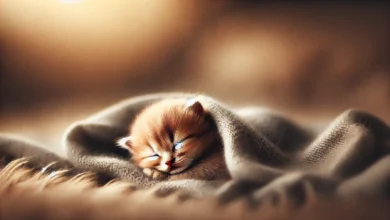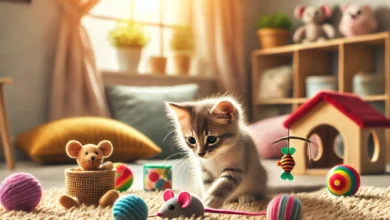Understanding Kitten Sleep Patterns
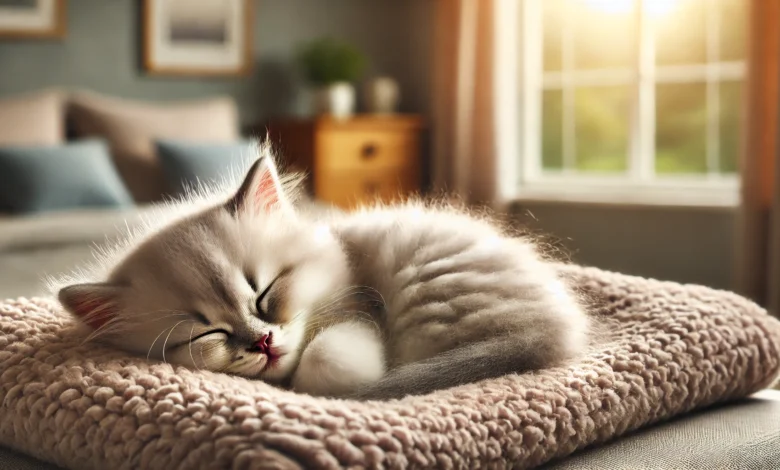
Being a new kitten owner, you may notice that your little furball is sleeping much more than you would expect.
Similar to human babies, kittens need tremendous amounts of sleep to grow strong and healthy.
But why is sleep so important to kittens, and how does it help with their overall development?
Below, we explore the fascinating world of kitten sleep to help you understand why they spend most of their day snoozing, how much sleep they really need, and how to create the best sleeping environment for them.
Table of Contents
Why Sleep Is Important in Kitten Growth and Development
Sleep is a critical aspect of a kitten’s growth and development.
This is the most sensitive period in which both physical and mental changes take place.
Inadequate rest could lead to reduced or slower growth in kittens.
Therefore, it is crucial to ensure that during the first months of their life, kittens get sufficient rest.
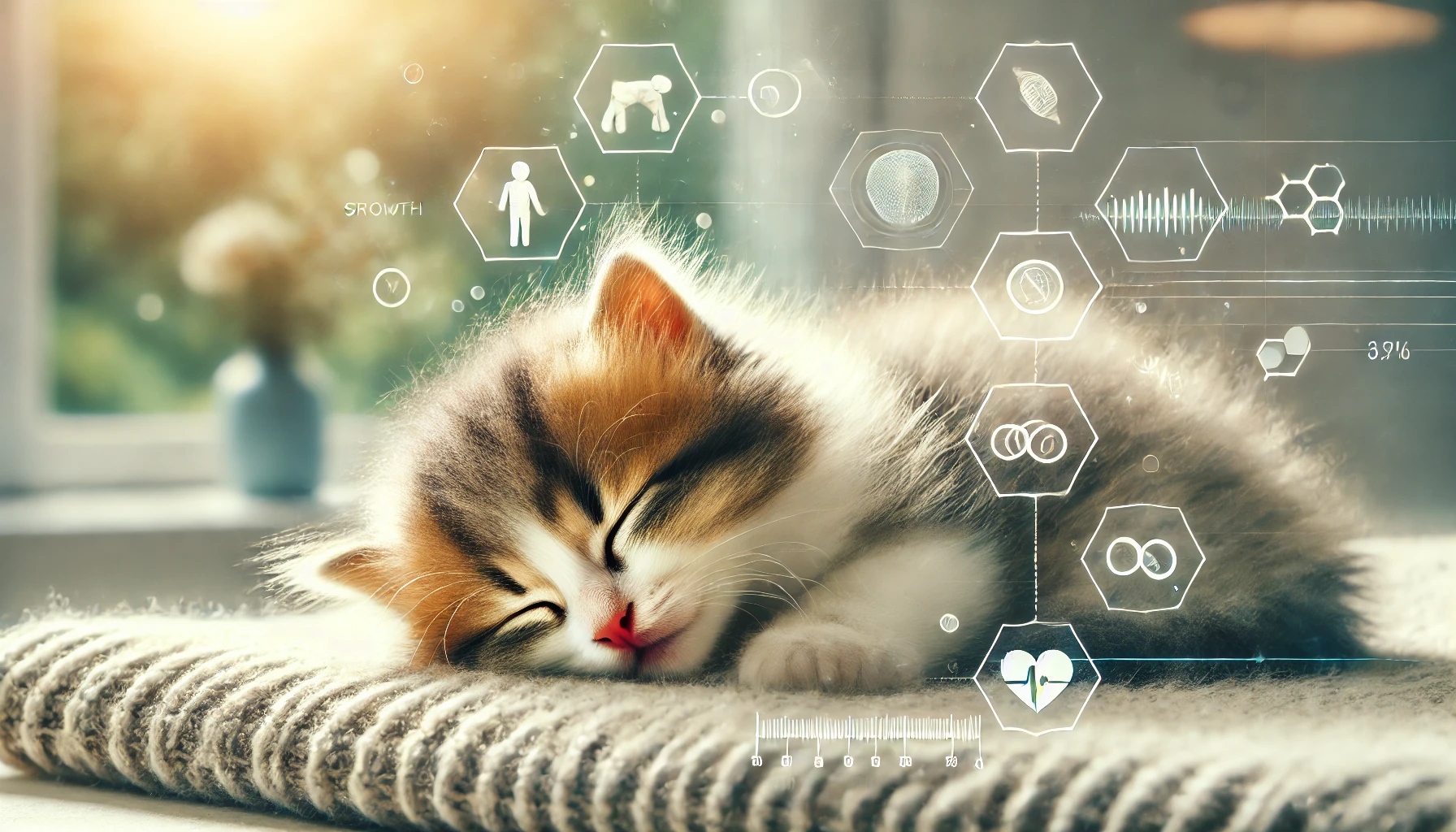
How Sleep Affects Growth
While sleeping, a kitten’s body focuses on repairing tissues, building muscles, and strengthening their immune system.
Growth hormones are released primarily during sleep, so the more quality rest a kitten gets, the more opportunities their body has to grow and develop correctly.
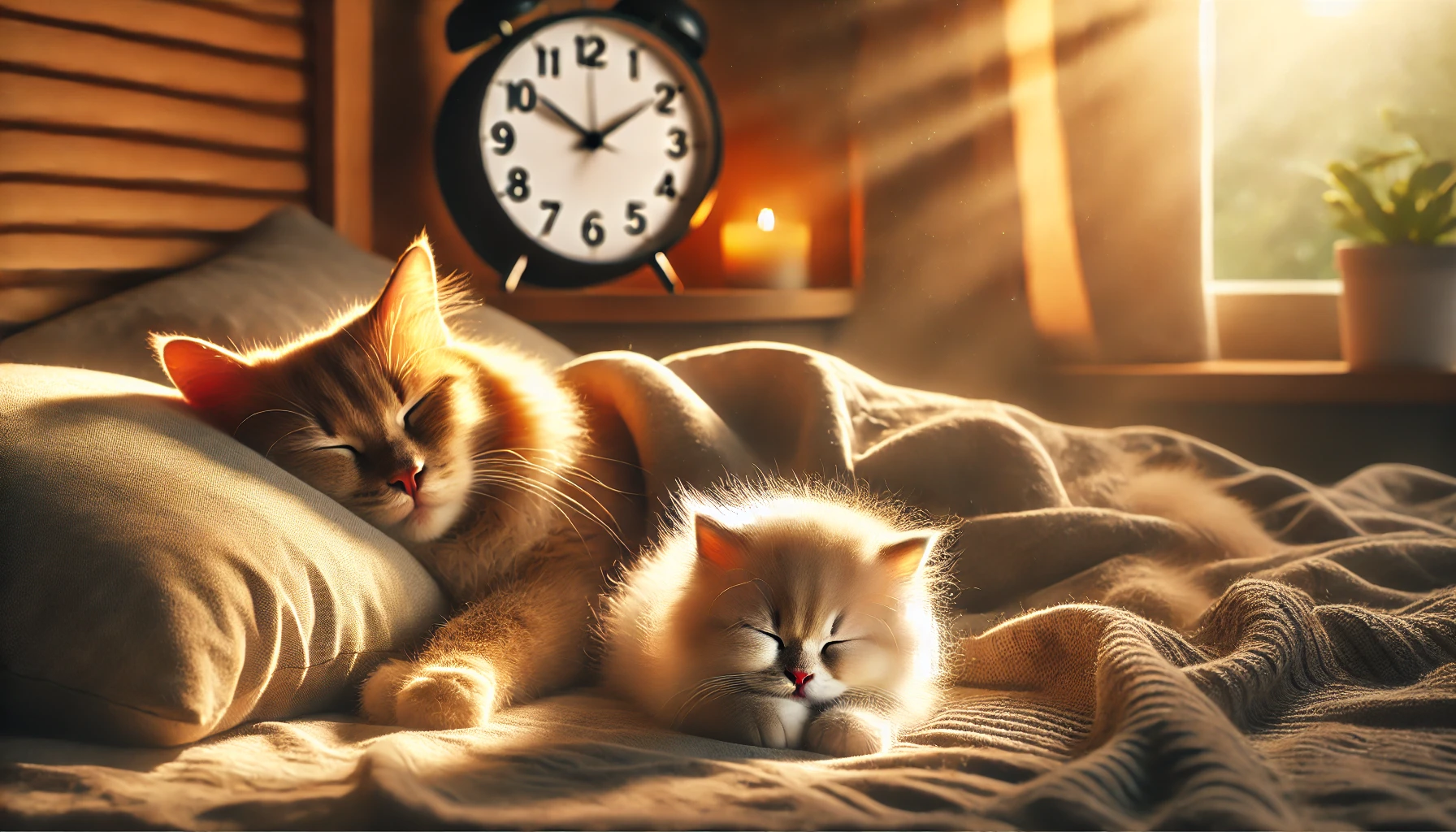
Why Kittens Need More Sleep Than Adults
Kittens can sleep for as long as 18 to 22 hours a day!
This is because their little bodies are still in the rapid phase of growth and development.
Immune systems, muscles, bones, and cognitive functions are all growing, which requires a lot of rest for optimal function.
- Strengthens their immune system through recuperation.
- Supports muscle and bone development.
- Enhances cognitive development and learning of new behaviors.

Cognitive Development During Sleep
Besides physical growth, sleep is crucial for a kitten’s brain development.
Kittens are constantly learning about their environment, and sleep helps process and store this information in their brains for future use.
This supports the development of motor skills, memory, and problem-solving abilities over time.
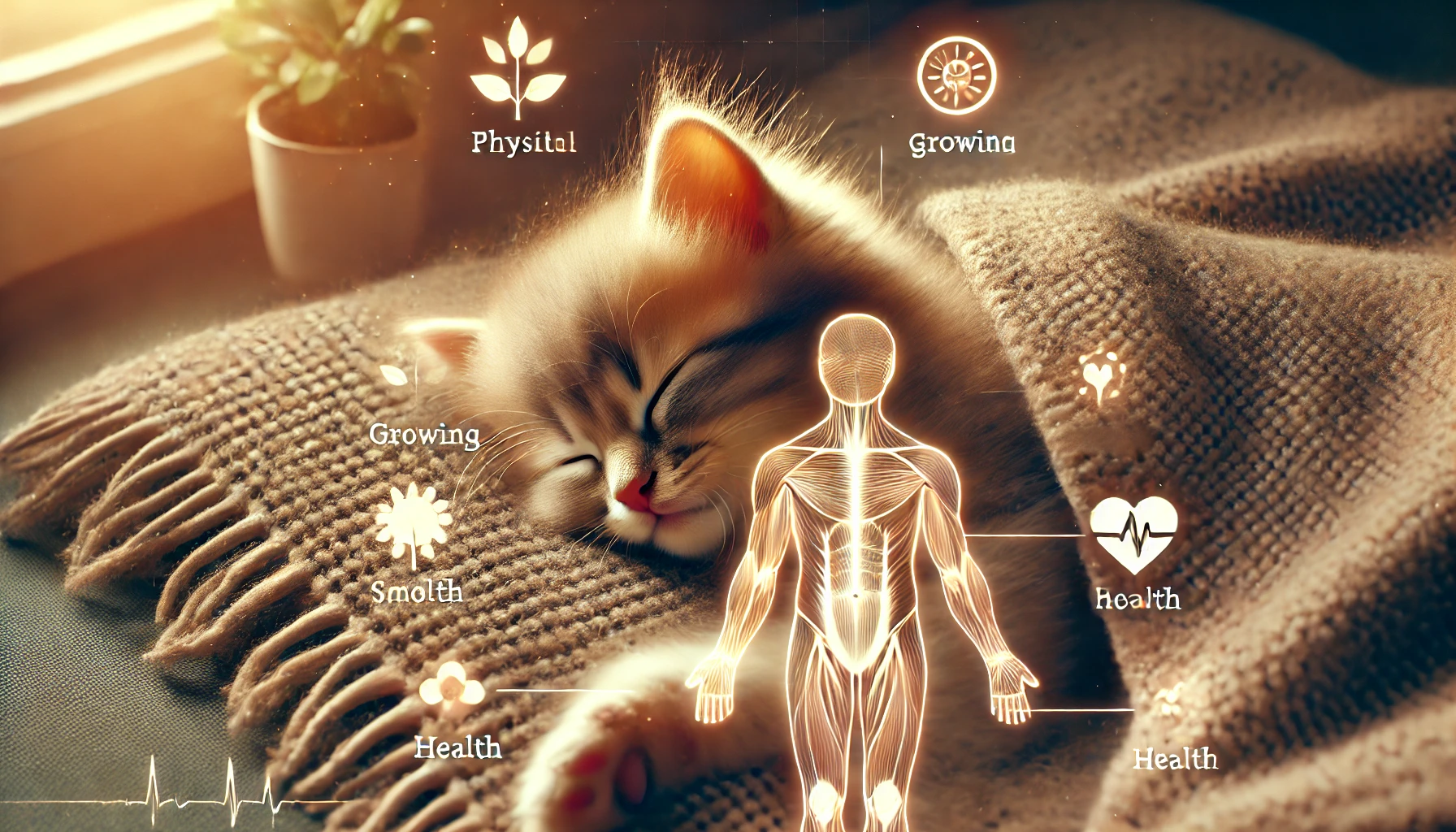
Physical Growth and Sleep
Another reason sleep is vital for kittens is due to their physical growth.
As kittens transform from tiny newborns into energetic, inquisitive cats, much of this growth occurs during deep sleep when their bodies can focus on regenerating tissues and building new cells.
Kittens need a lot of sleep to grow and develop properly, ensuring strong physical and cognitive growth.
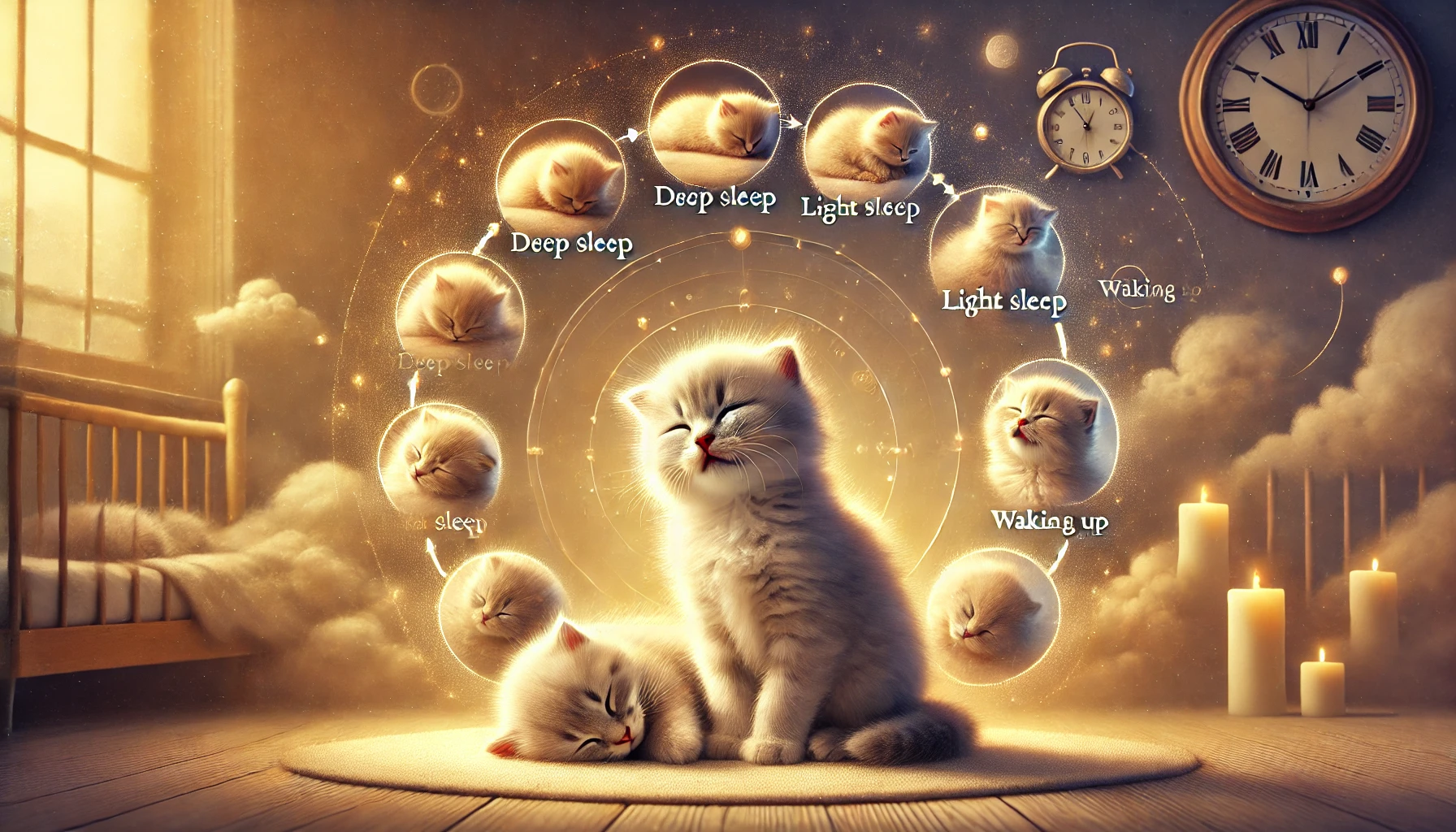
How Long Do Kittens Sleep? Understanding Kitten Sleep Cycles
As most people know, kittens are naturally sleepy animals.
But how much sleep is normal?
Kittens, like adult cats, are notorious for sleeping.
On average, they sleep between 18 to 22 hours per day, especially in the first months of their lives.
While this might sound excessive, it is essential for both their physical and cognitive growth.
As kittens grow, their need for sleep gradually decreases, but they still spend the majority of their day snoozing.
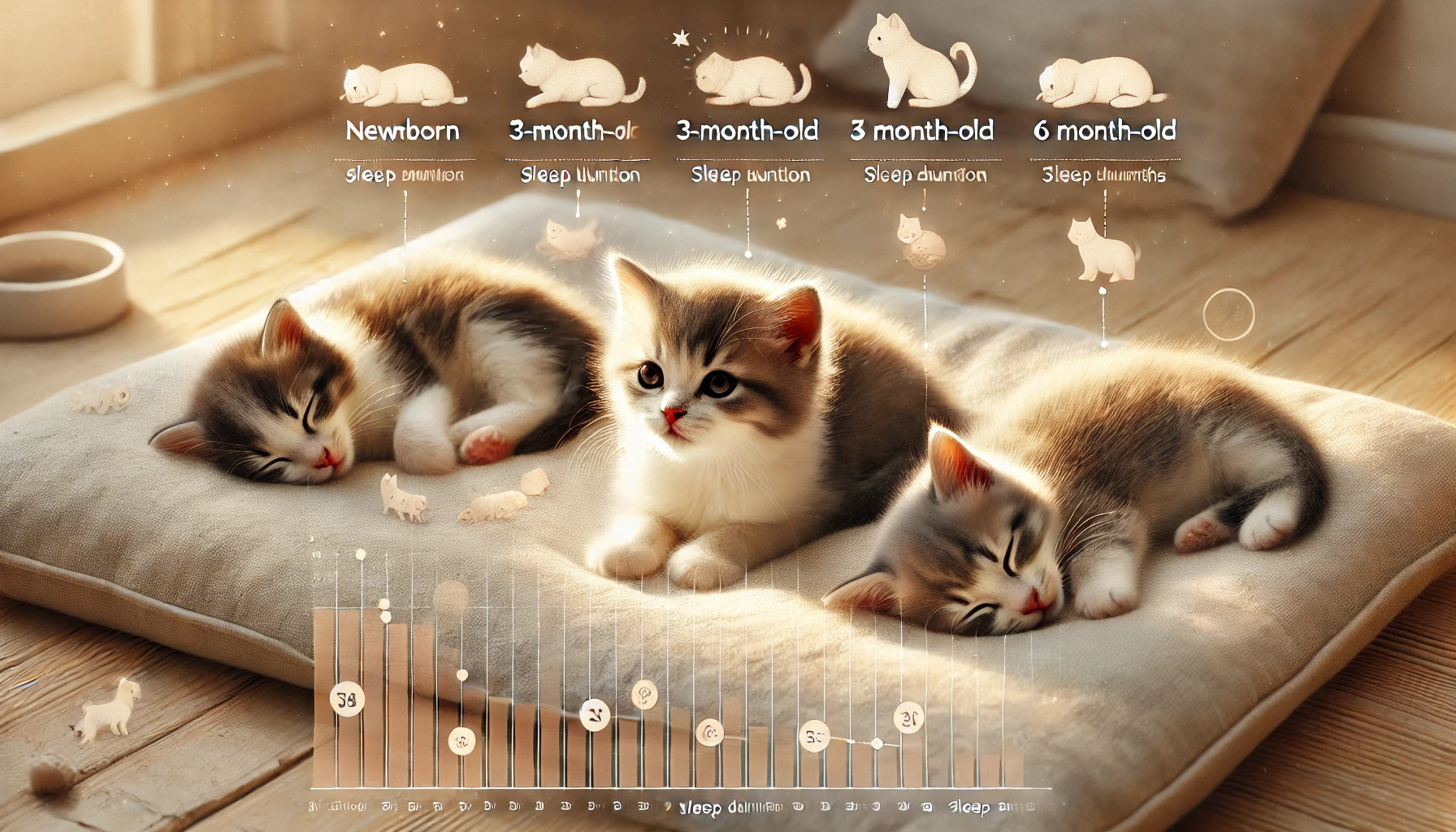
Average Sleep Duration Depending on Age
The amount of sleep a kitten needs changes with age.
Newborn kittens can sleep up to 22 hours a day, only waking briefly to feed.
By the time they reach 3 months of age, this decreases slightly, but they still need around 18 hours of sleep each day.
When they reach 6 months old, their sleep patterns resemble those of adult cats, sleeping anywhere from 12 to 16 hours a day.
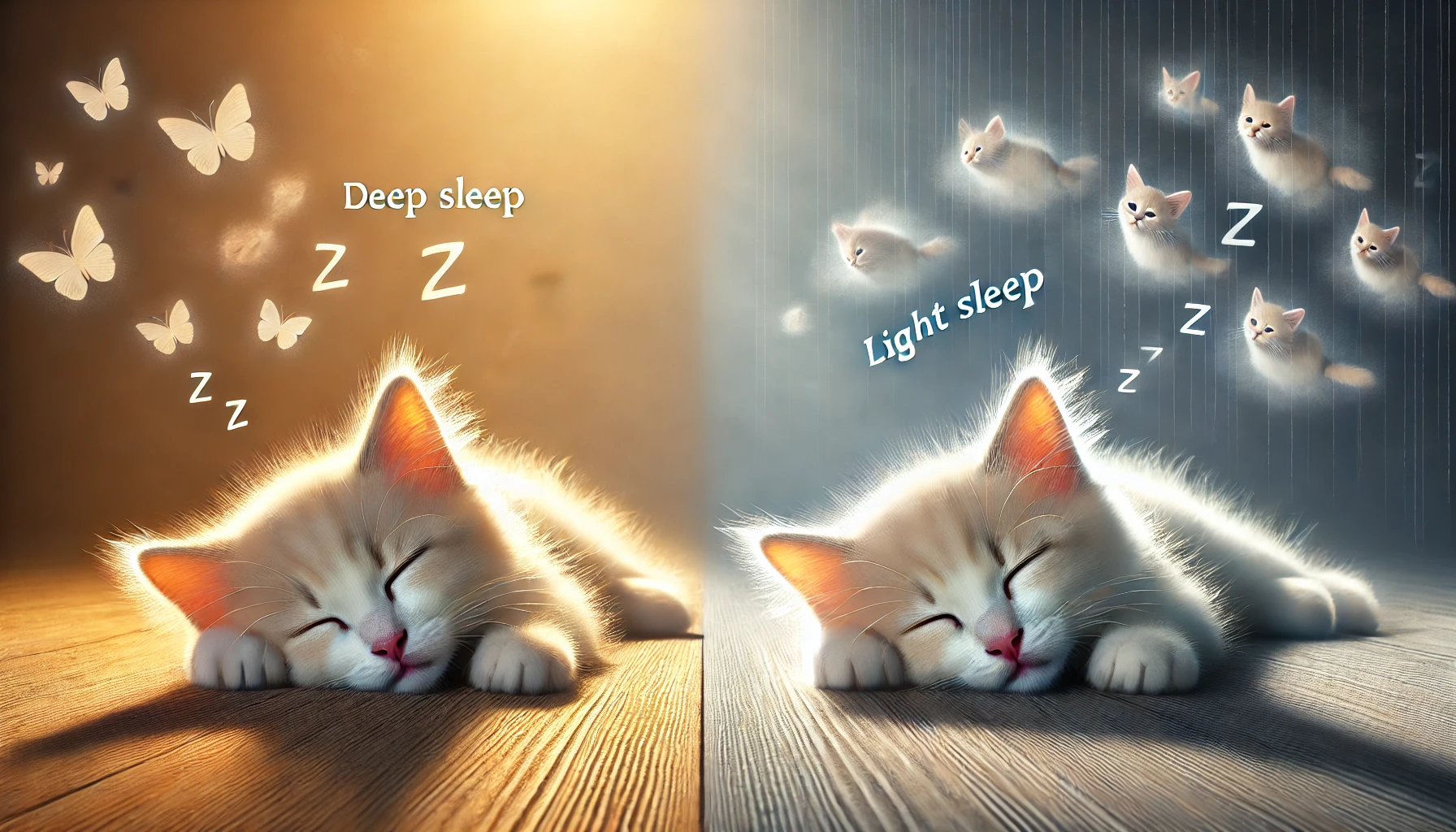
Deep Sleep vs. Light Sleep
Kittens experience two primary sleep states, similar to adult cats: deep sleep, also known as REM sleep, and light sleep.
During deep sleep, which only lasts a few minutes at a time, their bodies focus on regeneration and growth.
This is often when you’ll notice twitching, as kittens dream just like humans do.
Light sleep keeps them semi-aware of their surroundings, so they can stay alert in case of danger.
- Deep sleep is critical for physical and cognitive development.
- Light sleep helps them remain somewhat attentive to their environment.
- Kittens spend the day alternating between deep and light sleep.
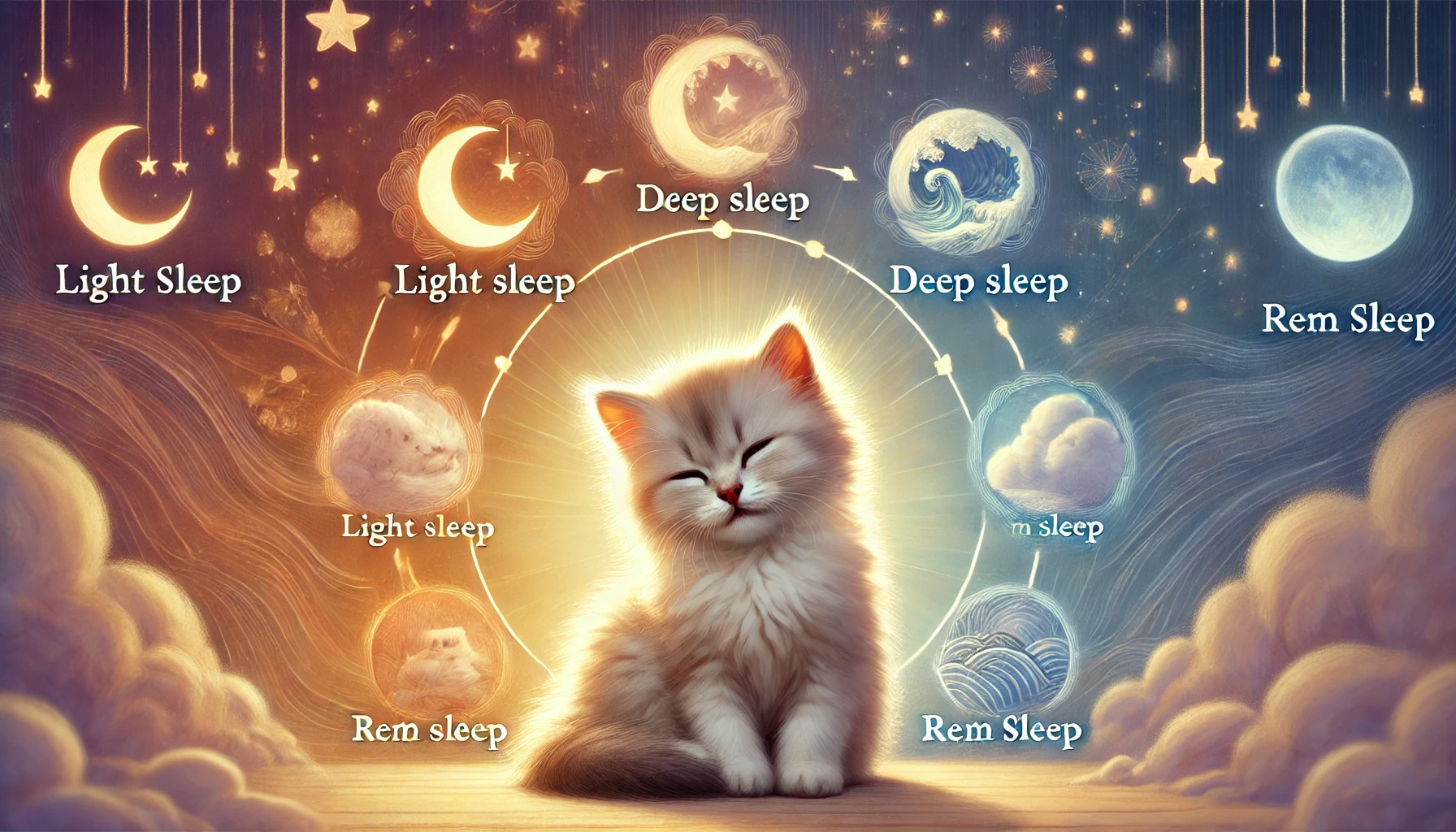
Critical Stages of the Sleep Cycle
A typical sleep cycle for kittens begins with a period of light sleep.
After a few minutes, they move into a deeper, more restorative sleep stage.
This cycle repeats throughout their naps, which is why kittens often wake up frequently.
Despite these brief wake-ups, their total sleep time still adds up to many hours of restful sleep.
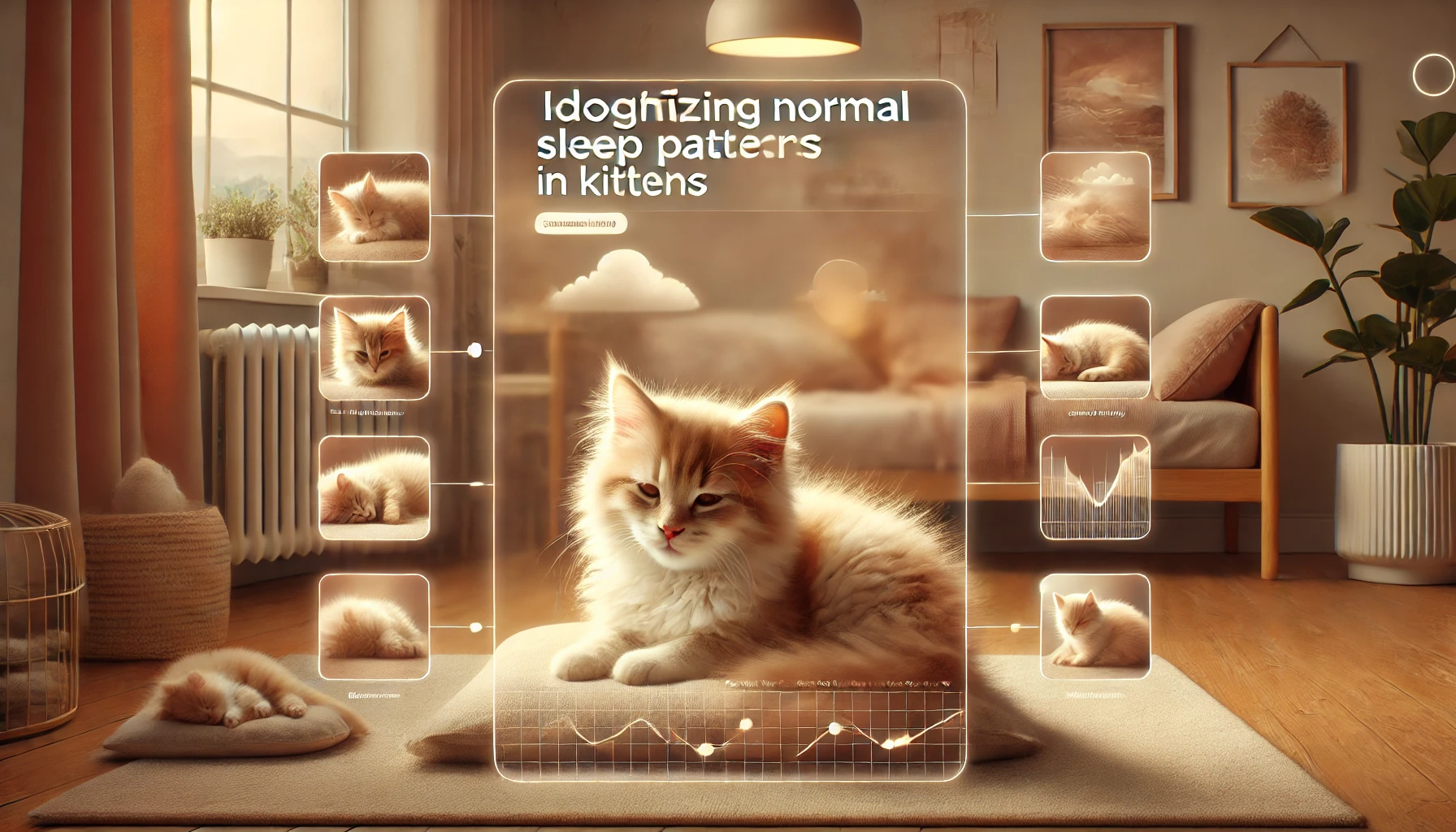
Identifying Normal Sleep Patterns
As they grow, kittens fall into regular sleep patterns.
Typically, they sleep in short spurts throughout the day, waking intermittently to play, eat, and explore.
As they get older, their sleep may consolidate, much like that of adult cats.
However, if a kitten is sleeping excessively or appears sluggish when awake, this could be a sign of a health issue, and you should monitor their behavior closely.
If needed, consult a veterinarian.
Kittens sleep up to 22 hours a day, particularly when they are newborns, to support their rapid growth.
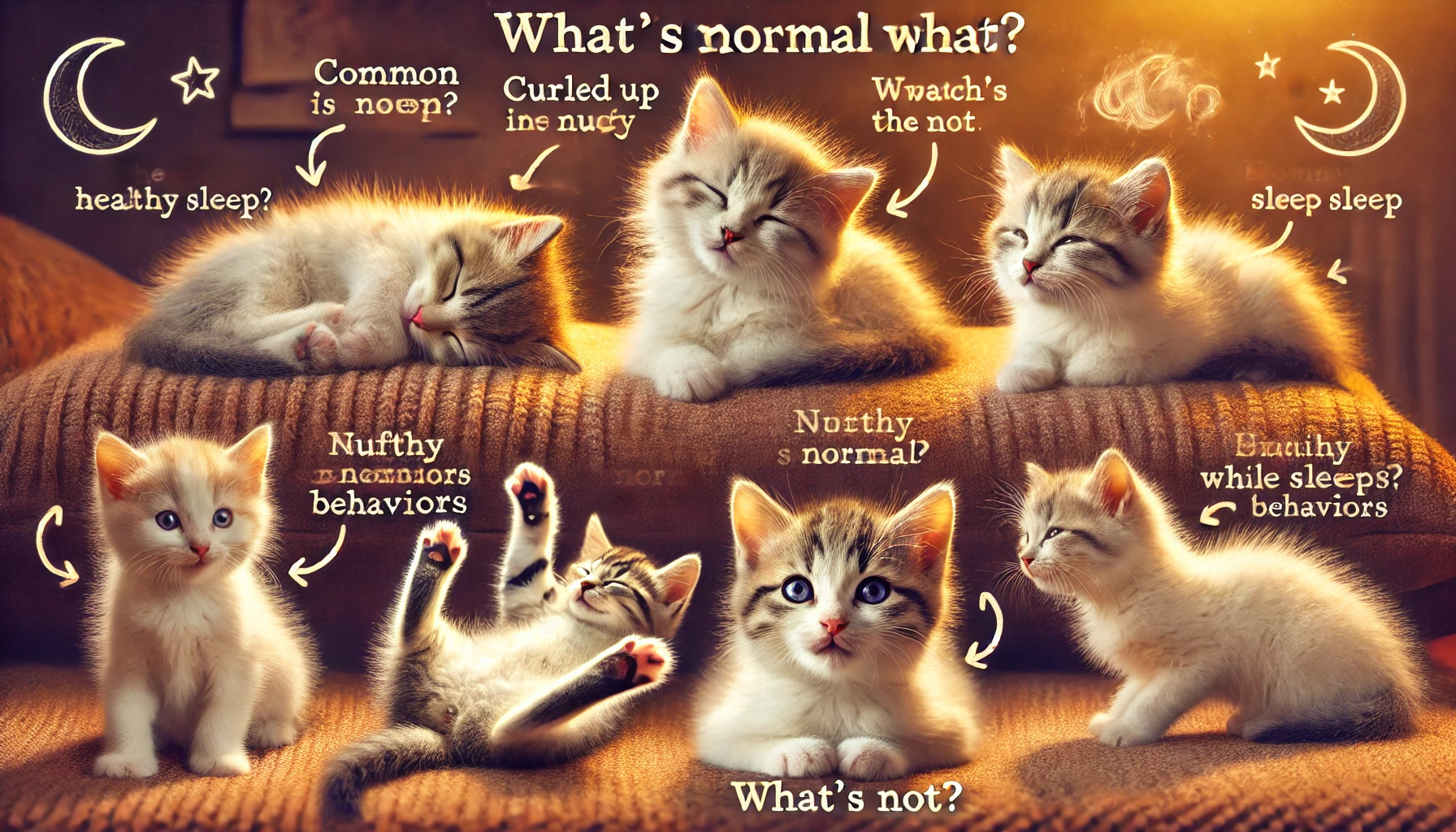
Common Kitten Sleep Behaviors: What’s Normal and What’s Not
Kittens can exhibit a wide range of sleep behaviors, many of which may look strange to new kitten owners.
While most of these behaviors are completely normal, it’s important to know what to expect and recognize when something might be wrong.
From sleeping in unusual places to frequent twitching, kittens have sleep habits that are often adorable but sometimes worrying for first-time owners.
Understanding these behaviors will help you assess your kitten’s health and wellbeing more effectively.
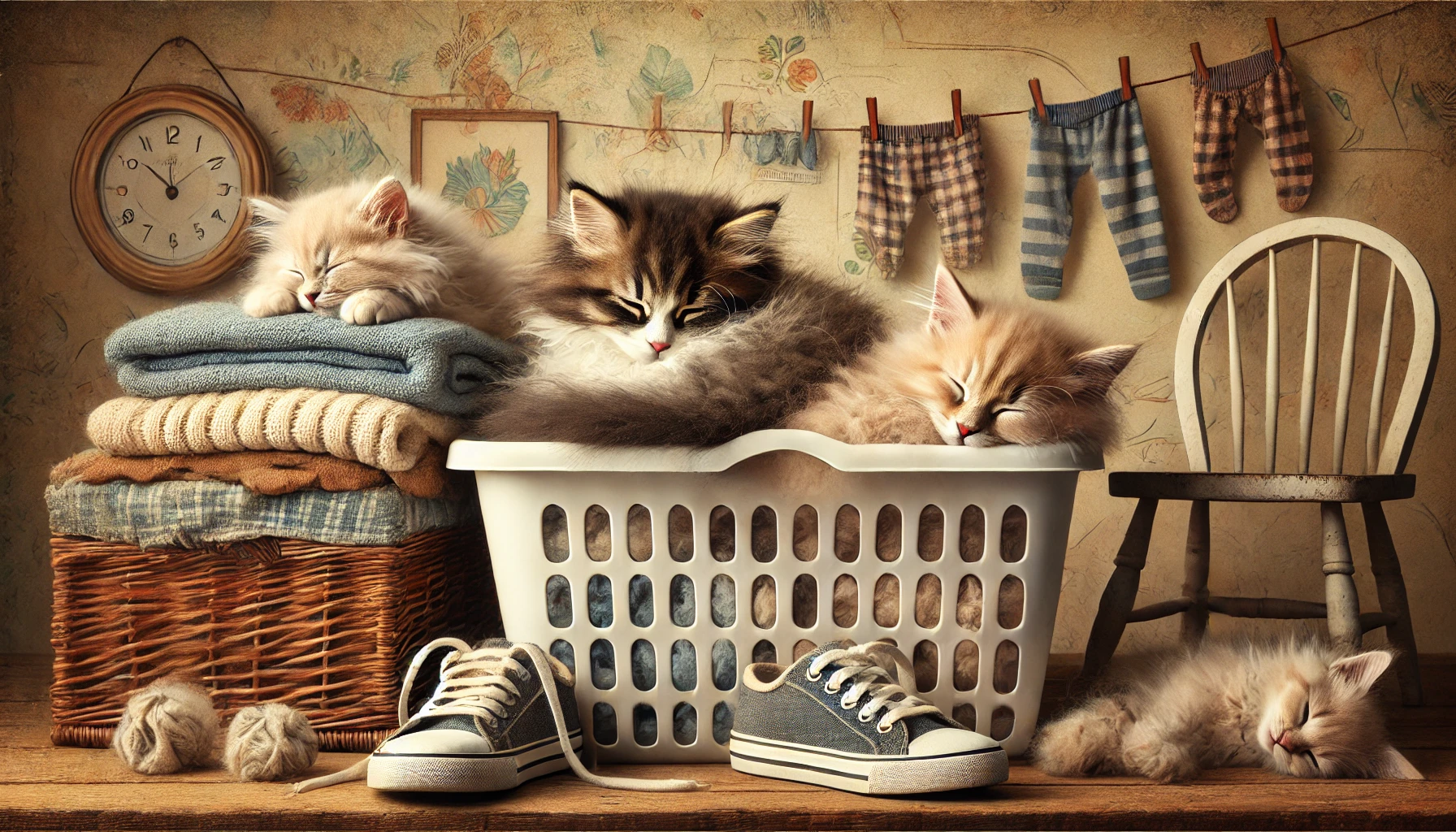
Kittens Sleeping in Unusual Places
It’s not unusual for kittens to fall asleep in the most unlikely places: closets, under furniture, or even in a laundry basket.
They tend to look for quiet, cozy spots where they feel safe and secure.
This is normal behavior; however, you should make sure these areas are safe and free from hazards that may injure your kitten.
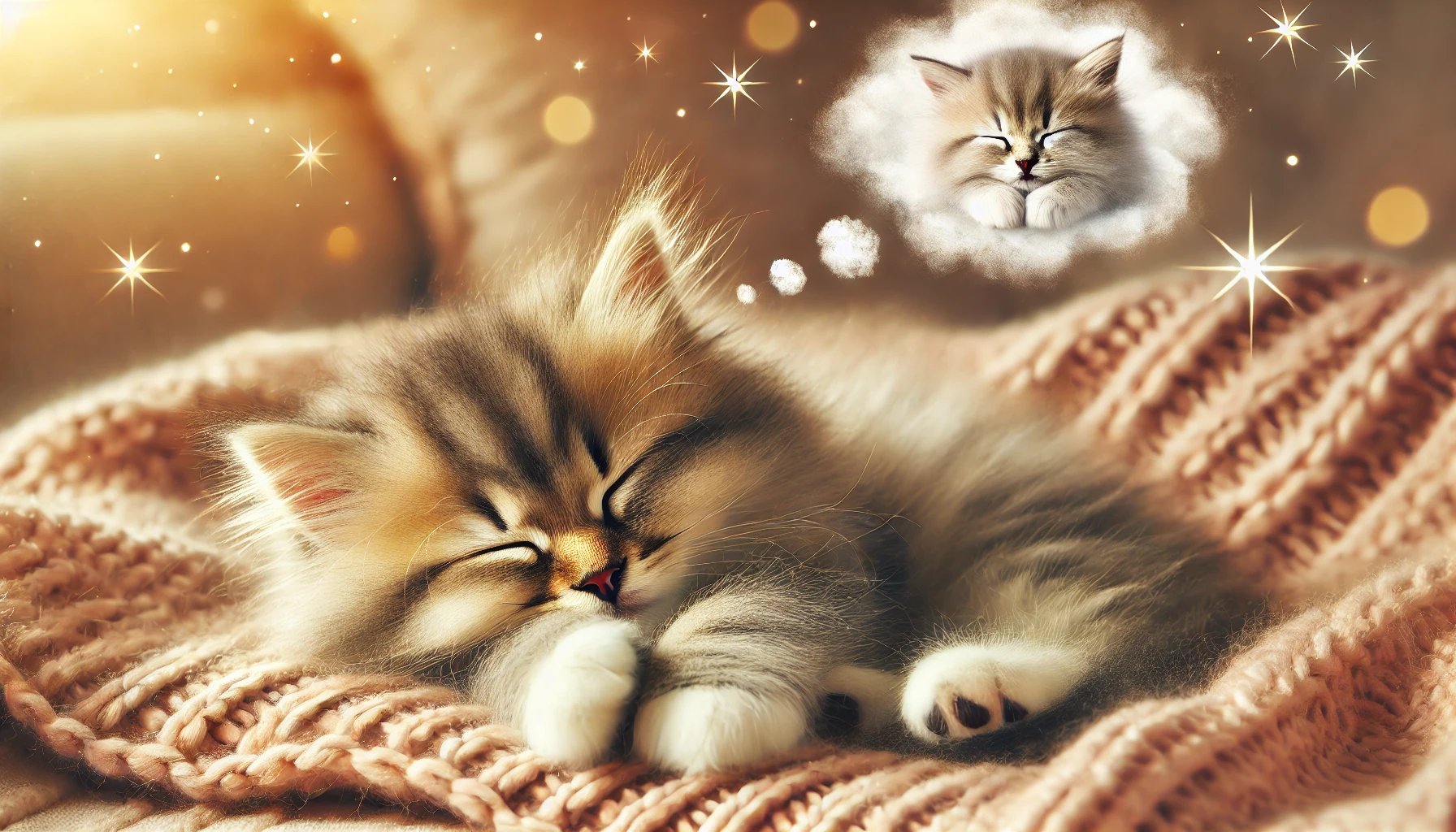
Twitching and Dreaming
If you’ve noticed your kitten twitching or making small noises while they sleep, there’s no need to worry—this is completely normal.
Like humans, kittens experience REM sleep, which is the stage where dreaming occurs.
You may see their paws, tails, or whiskers twitch during this stage, which is a sign that they are dreaming.
This twitching is also an indication that your kitten’s brain is developing and processing the information they learned during their waking hours.
- REM sleep is essential for brain development.
- Twitching during sleep is part of the normal dreaming process.
- Small movements during sleep are a sign that the brain is active.
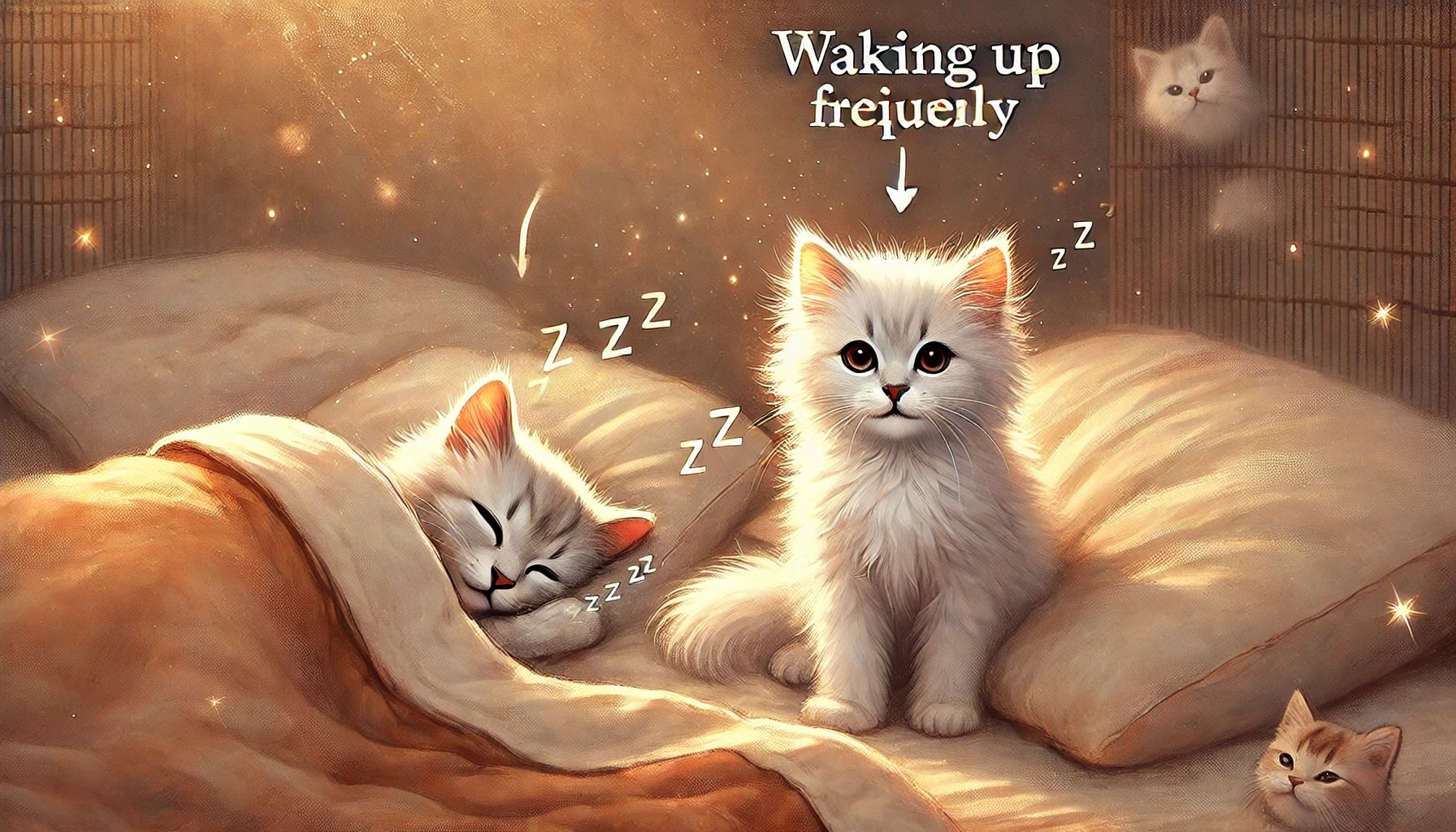
Waking Up Frequently
Kittens often wake up frequently during naps, which may puzzle new owners.
However, this behavior is entirely normal.
Kittens alternate between light and deep sleep, waking briefly between these stages.
This is a natural part of their sleep cycle, and as long as they fall back asleep quickly, there’s no need to be concerned.
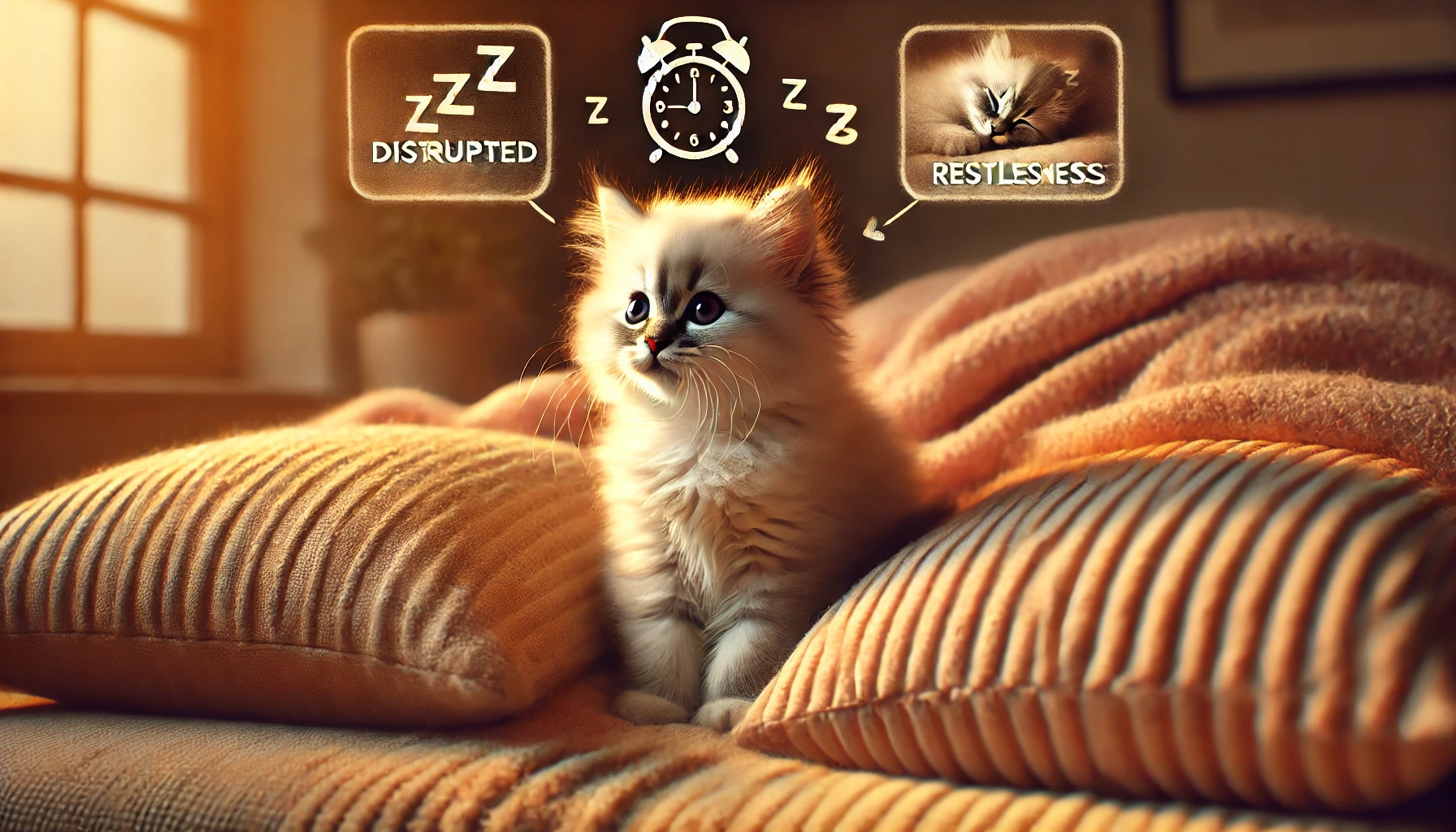
Signs of Disrupted Sleep
While most kitten sleep behaviors are normal, some could indicate disrupted sleep.
If your kitten seems restless, wakes up too often, or has trouble settling down, it could be a sign of discomfort, anxiety, or an underlying health problem.
If these signs persist, it’s important to consult a veterinarian for advice.
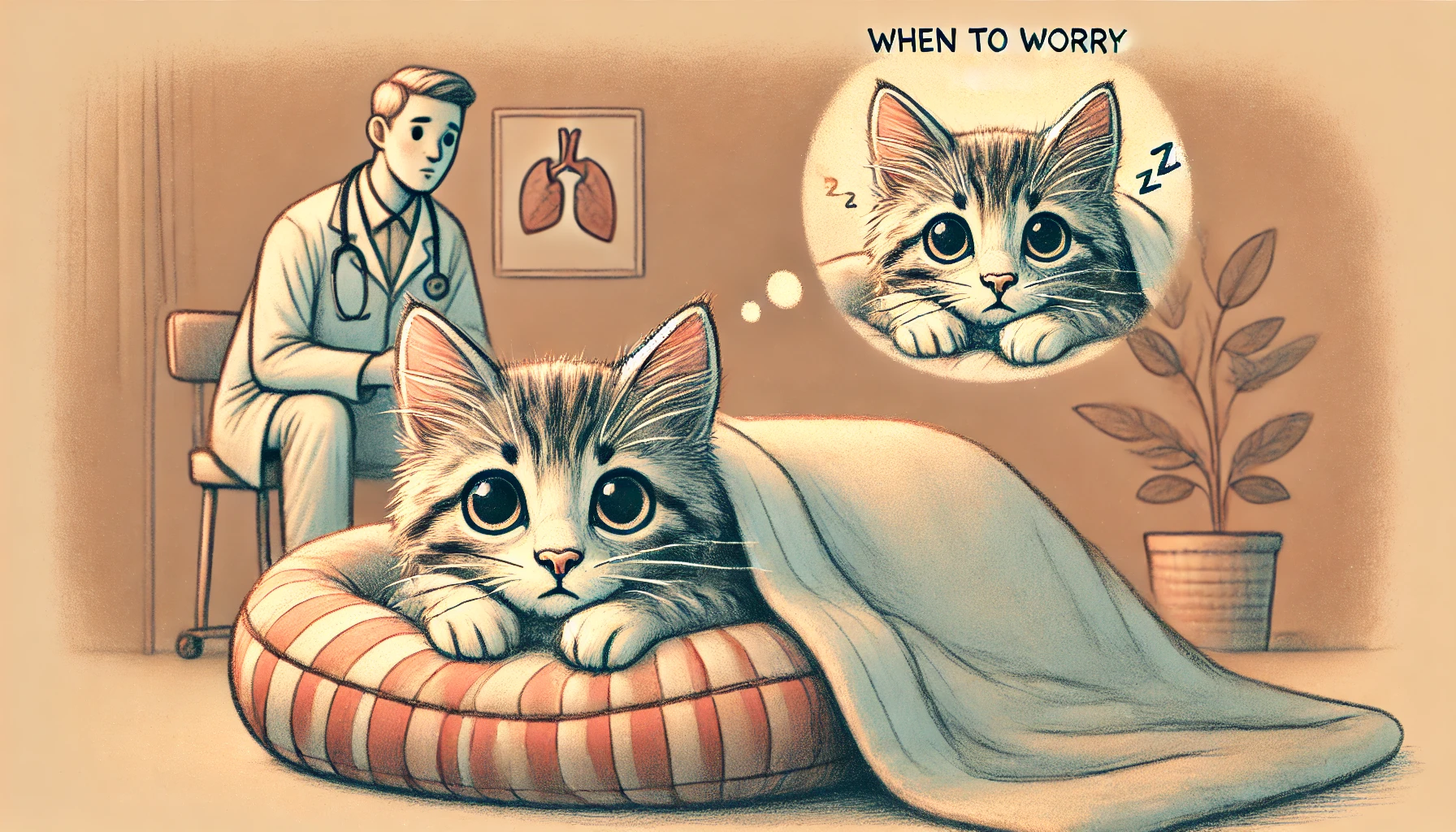
When to Worry About Kitten Sleep
In general, kittens sleep a lot, but if you notice extreme lethargy or difficulty waking your kitten, it could be a cause for concern.
Excessive sleep combined with low energy levels when awake might indicate a health issue such as illness or infection.
Always monitor your kitten’s overall behavior and consult a veterinarian if something seems off.
Understanding normal sleep behaviors like twitching during REM sleep can help kitten owners know when something might be wrong.
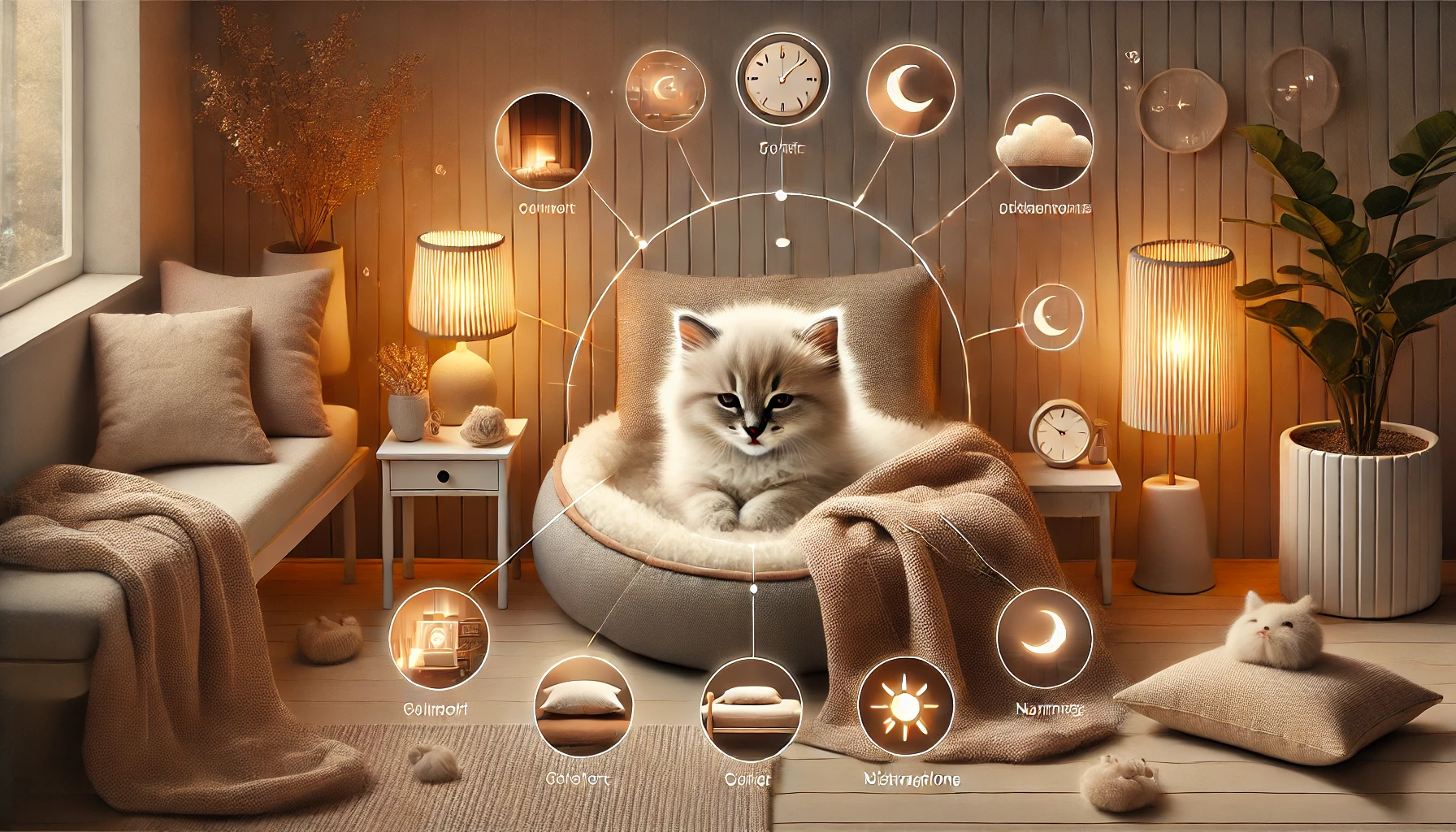
Creating a Sleep-Friendly Environment for Your Kitten
A comfortable and secure sleep environment is essential for ensuring your kitten gets the rest they need to grow healthily.
A sleep-conducive space not only assures better rest but also helps them feel safe and relaxed.
From setting up the right bedding to cultivating a quiet atmosphere, here are a few ways you can help foster a peaceful sleep routine for your kitten.
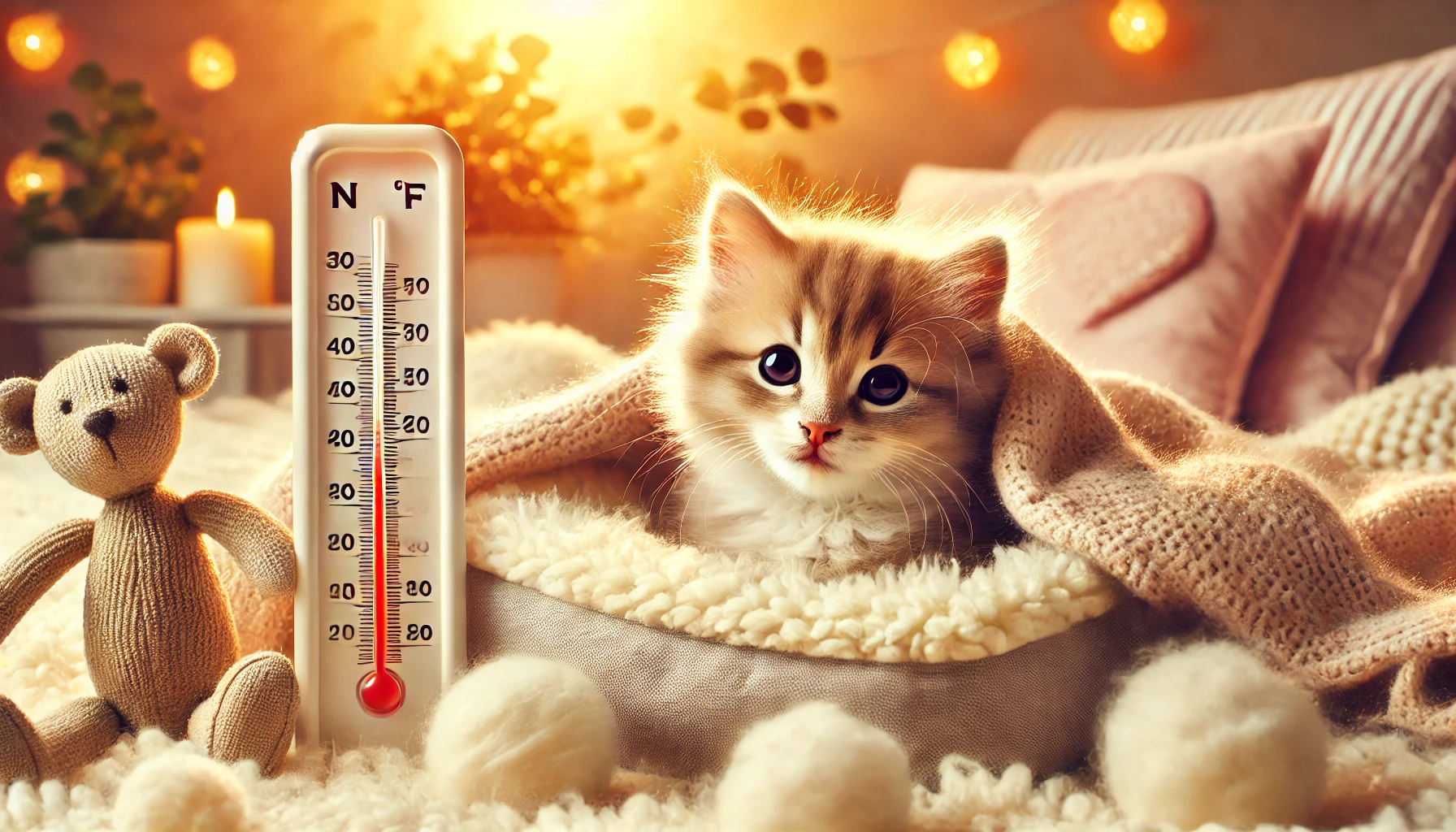
Temperature and Bedding
Kittens are sensitive to cold, making it important to provide warm places for them to sleep, especially during their first few months.
The ideal temperature for a kitten’s sleeping area should be approximately 75°F (24°C).
Soft bedding materials, like fleece or plush blankets, keep them warm and comfortable.
Ensure that the bedding is easy to clean, as kittens tend to be quite messy, especially at a young age.
- Maintain a temperature around 75°F for ultimate comfort.
- Use warm, soft bedding such as fleece or plush blankets.
- Bedding should be low maintenance and easy to clean.
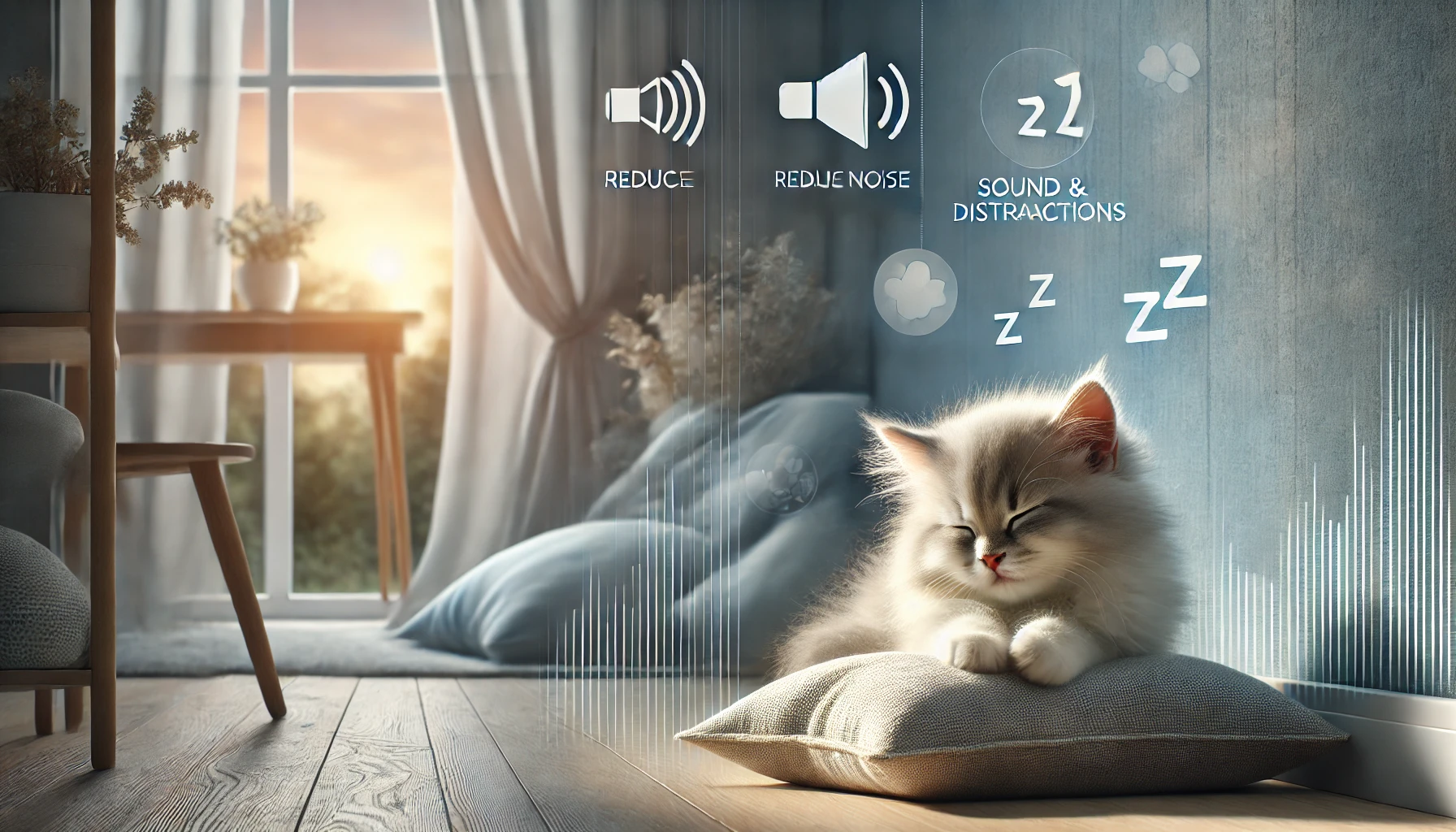
Reducing Noise and Distractions
Kittens can be easily startled by loud noises or sudden movements.
Placing their bed in a quiet, low-traffic area of the home will create a sleep-friendly environment for your kitten.
Avoid placing their sleeping spot near windows, doors, or areas with high activity to minimize noise and distractions, allowing your kitten to rest comfortably.
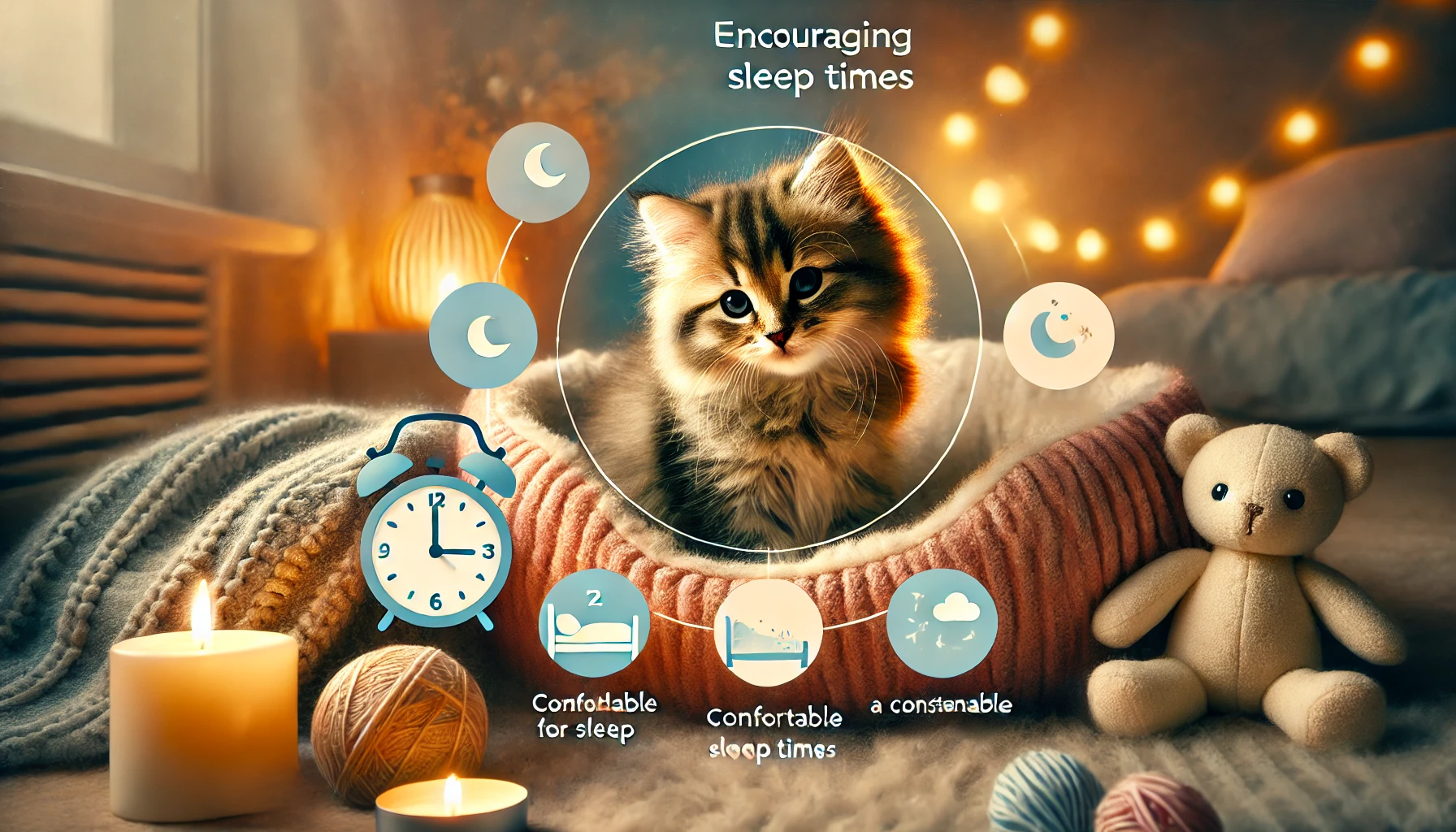
Encouraging Routine Sleep Times
Establishing a routine can help your kitten develop healthy sleep habits.
Try to keep feeding and playtimes consistent throughout the day, which can encourage your kitten to sleep more regularly.
You can also introduce a bedtime routine, such as dimming the lights and lowering noise levels before bed, signaling to your kitten that it’s time to sleep.
A regular routine helps regulate their internal clock, making it easier for them to wind down and get the rest they need.
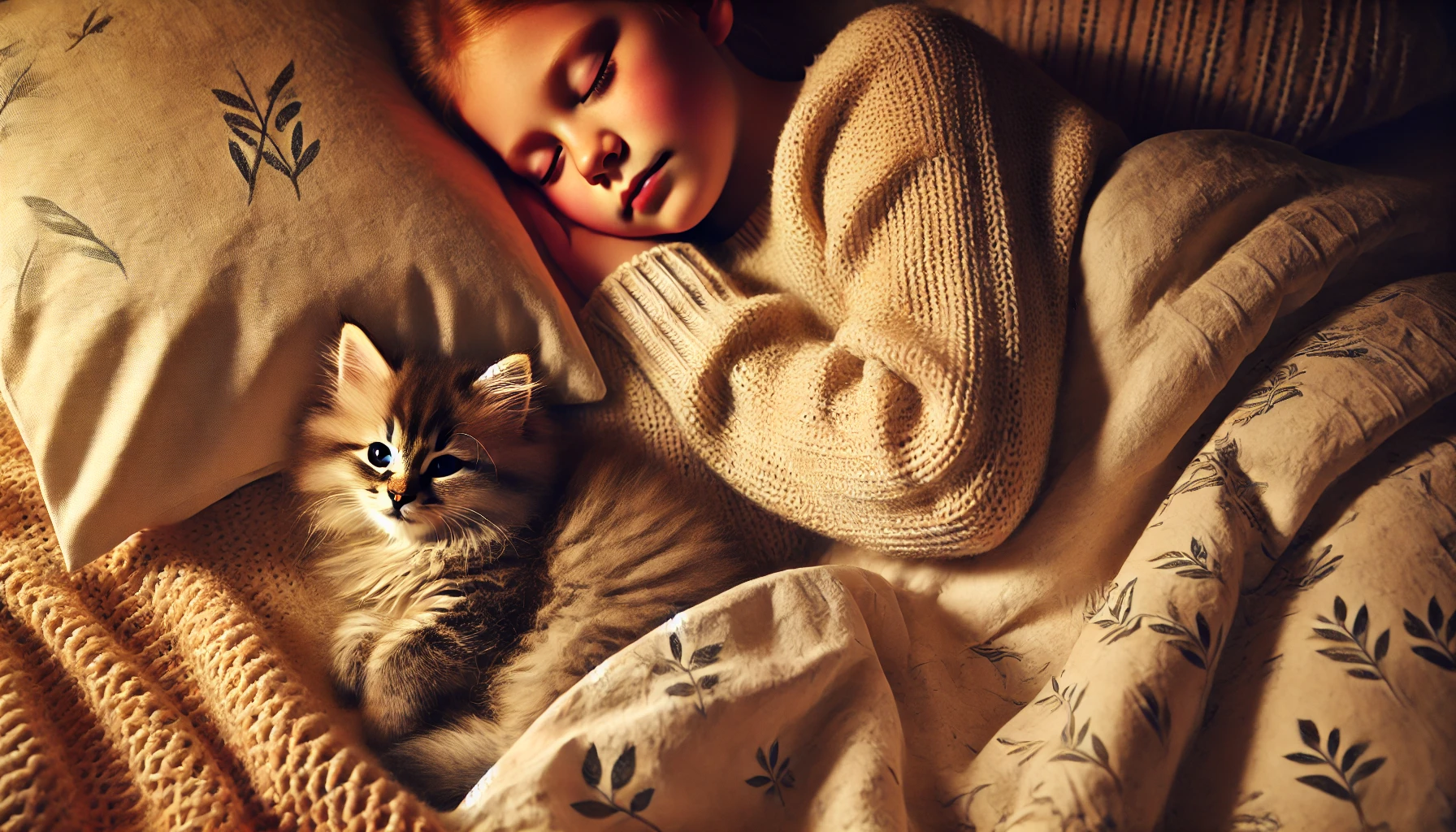
Should You Let Your Kitten Sleep With You?
Many kitten owners wonder if it’s a good idea to let their kitten sleep in bed with them.
While it may be comforting to have your kitten snuggled close, it’s generally recommended to provide them with their own sleeping area.
This helps them build independence and prevents accidents, like rolling over them during the night.
If you do allow your kitten to sleep with you, ensure it’s in a safe spot where they won’t be disturbed.
A warm and quiet sleeping space is key to ensuring your kitten gets the rest they need.
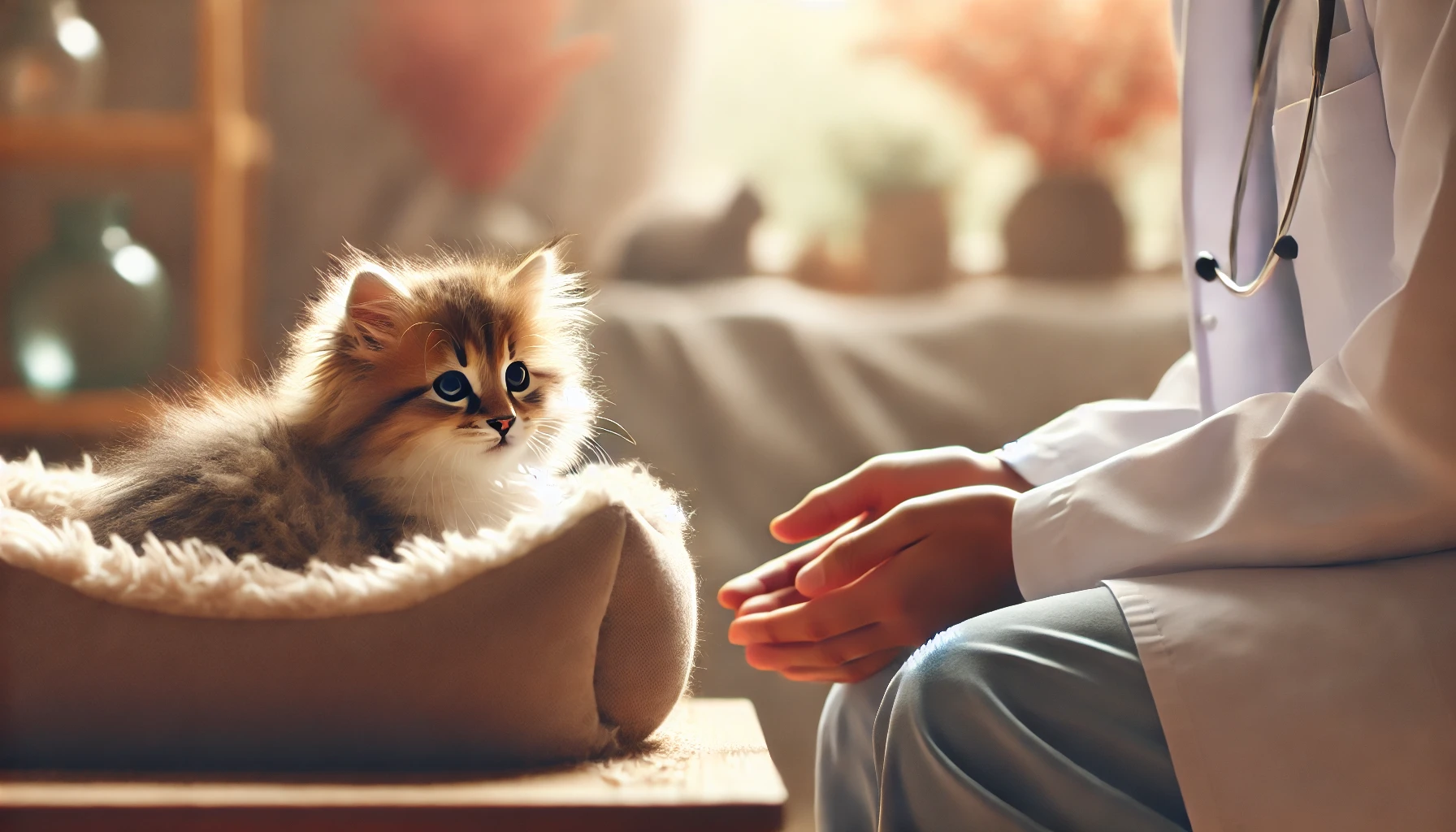
Kitten Sleep Disorders and How to Address Them
Though kittens sleep a great deal of the time, there are instances when their sleeping patterns may indicate underlying health disorders.
Early recognition and addressing of sleep disorders help your kitten stay healthy and grow properly.
Sleep disorders can affect kittens just as they do adult cats or humans, from sleep apnea to restlessness caused by anxiety.
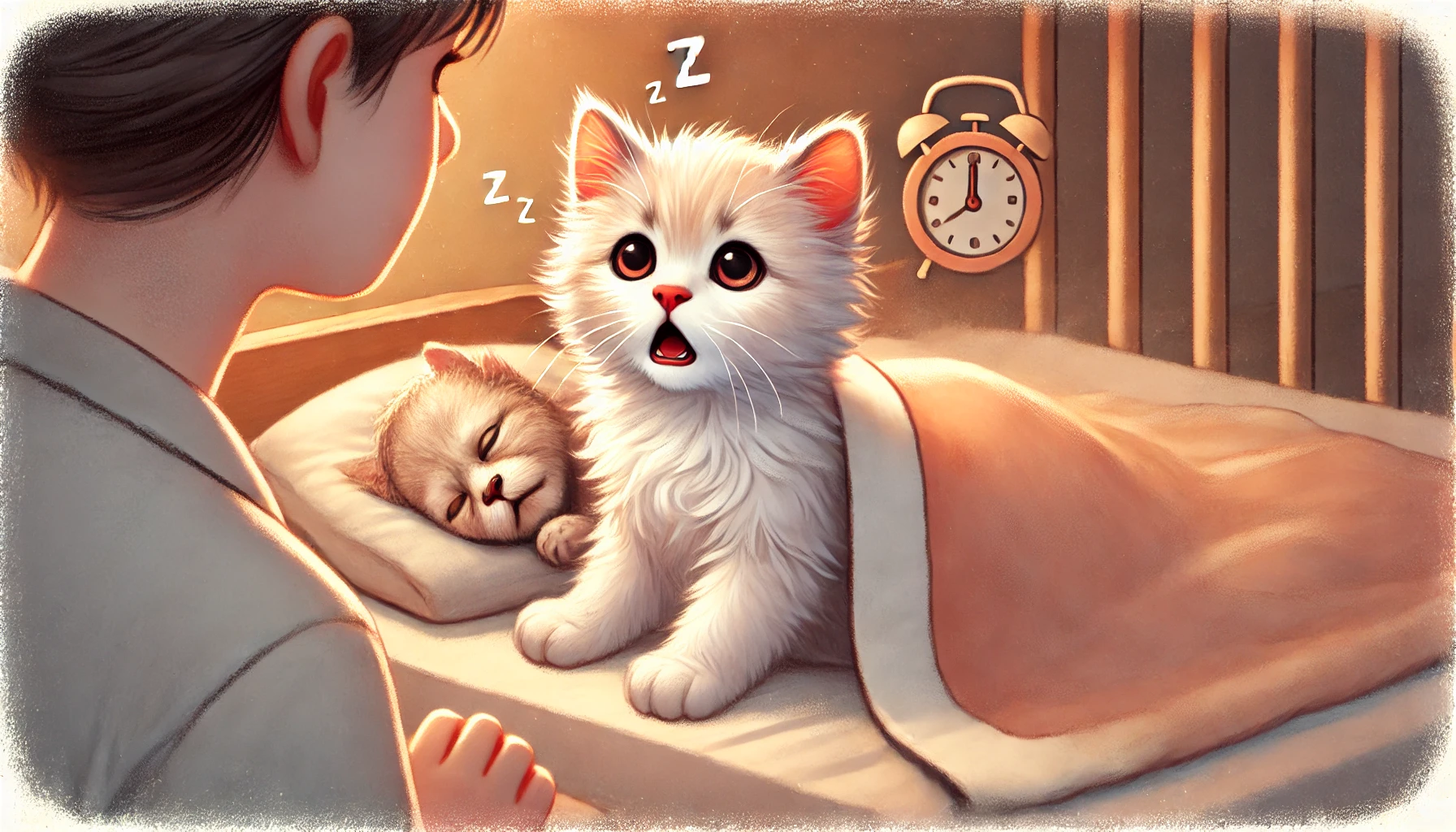
Recognizing Sleep Apnea in Kittens
Sleep apnea is a condition in which breathing stops during sleep.
While more common in older cats, it can also occur in kittens.
Symptoms include loud snoring, gasping for air, or frequent waking during sleep.
If you notice any of these signs, it’s important to consult a veterinarian.
Sleep apnea can prevent your kitten from getting the deep, restful sleep they need, affecting their overall health and growth.
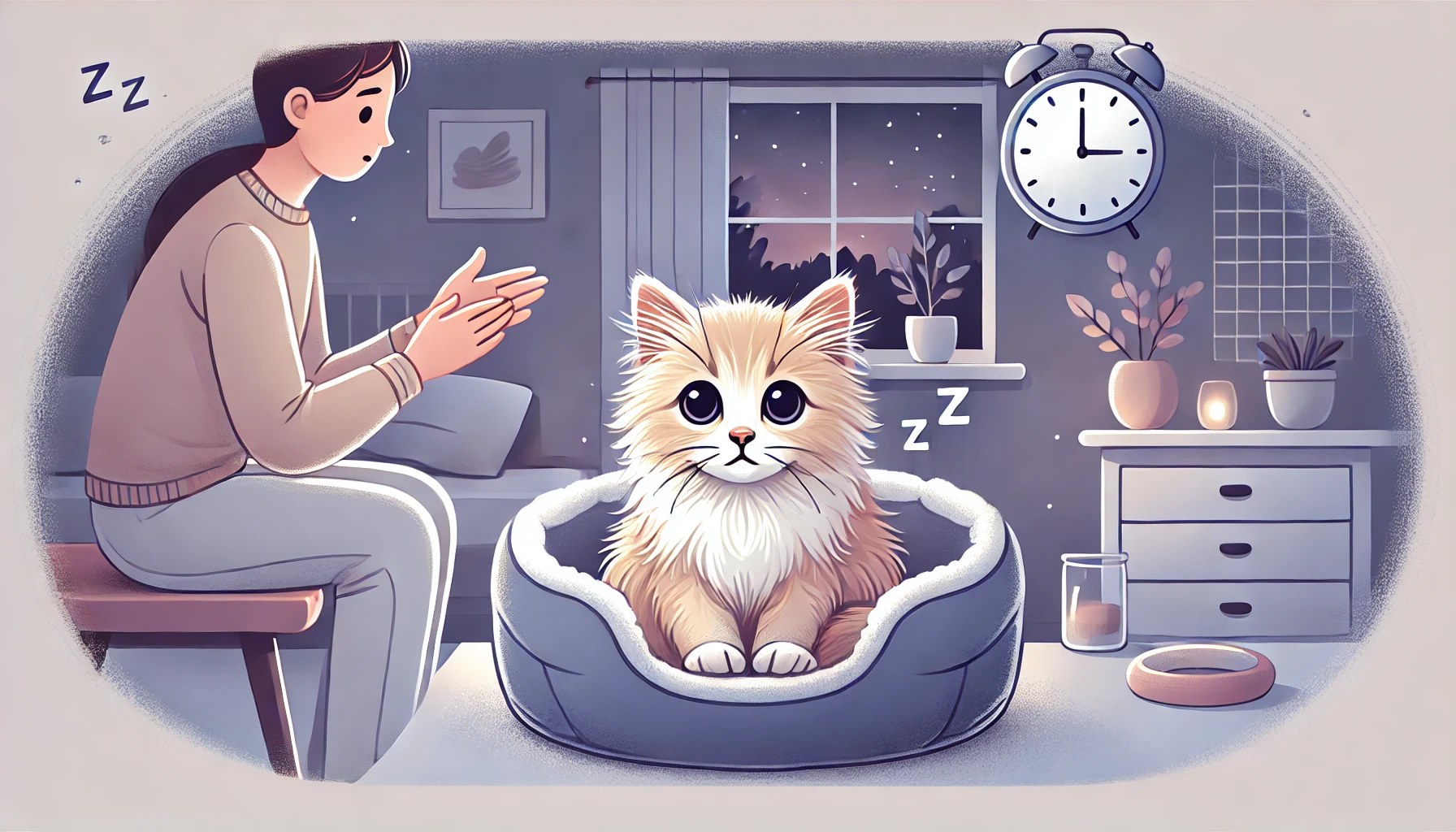
Handling Nighttime Restlessness
It’s not unusual for kittens to be restless at night, especially if they are in a new environment.
Anxiety, unfamiliar surroundings, and irregular routines can prevent your kitten from sleeping through the night.
Establish a regular bedtime routine and provide a quiet sleep environment to help your kitten rest well.
Make sure your kitten gets enough playtime during the day to use up their energy, making it easier for them to sleep soundly at night.
- Establish a consistent bedtime routine.
- Provide a quiet and peaceful sleep environment.
- Engage in active daytime play with your kitten to tire them out.
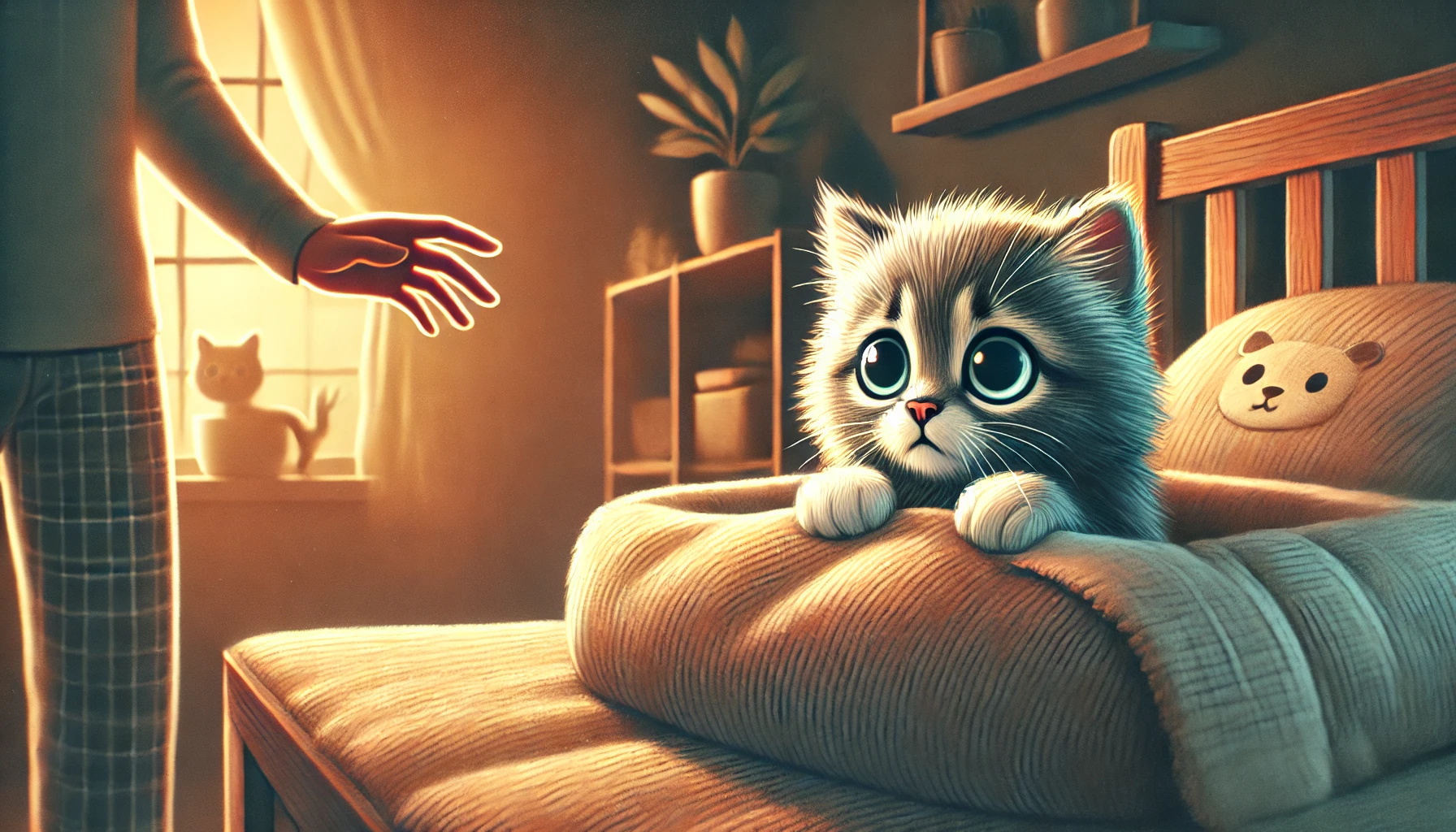
Signs of Anxiety Affecting Sleep
Anxiety can significantly impact your kitten’s sleep patterns.
An anxious kitten may have trouble falling asleep, pace around, or appear restless even when asleep.
Common causes of anxiety include changes in their environment, new pets or people, or separation from their mother and siblings.
If anxiety is affecting your kitten’s sleep, provide a safe, quiet space for them to rest and introduce them to new situations gradually.
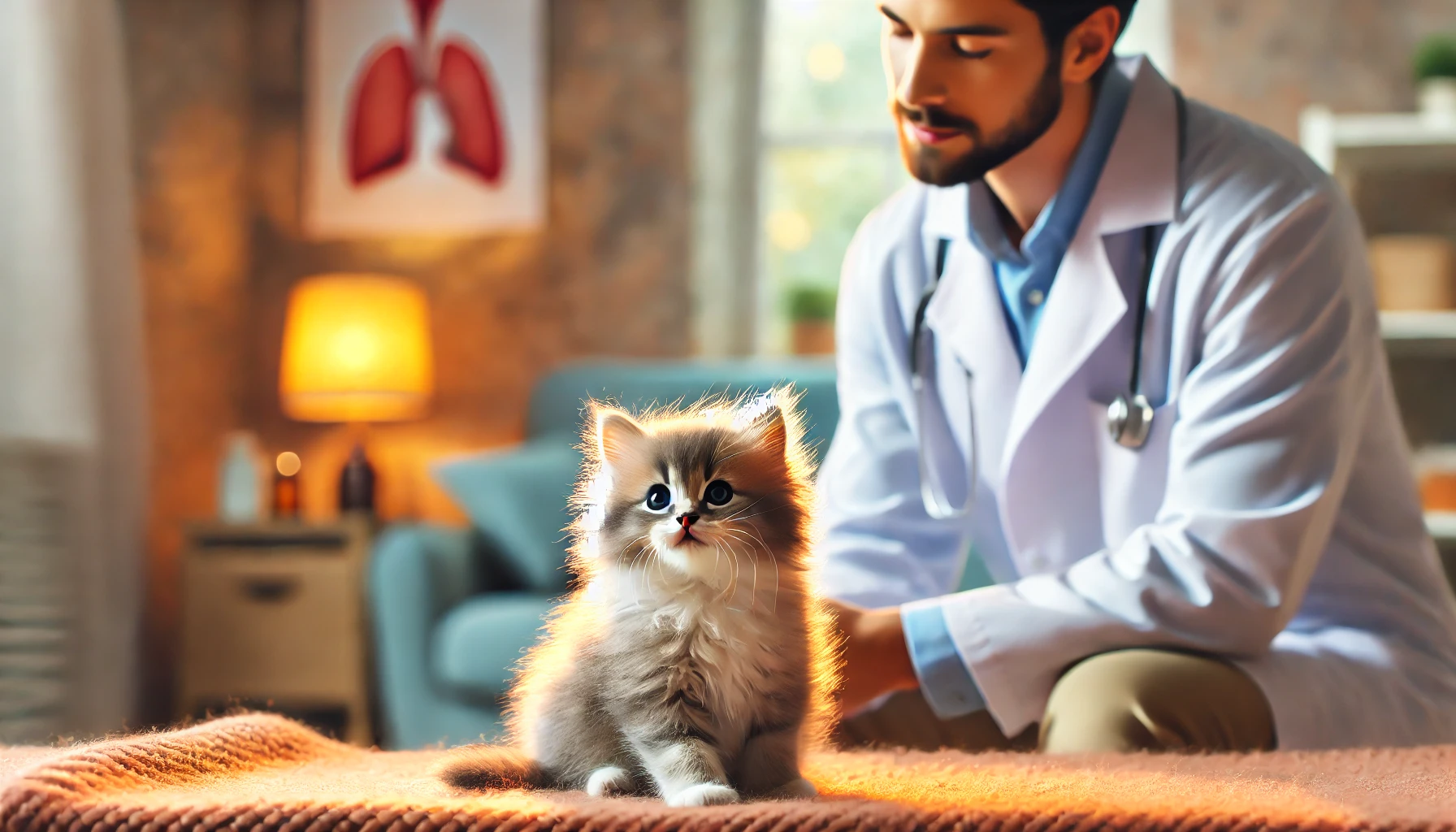
When to Consult a Veterinarian
It’s normal for kittens to experience some sleep disturbances as they adjust to new environments.
However, persistent sleep issues may indicate a health concern.
If your kitten struggles to sleep, frequently wakes up, or shows signs of distress, it’s best to consult a veterinarian.
Conditions like sleep apnea, anxiety, or infections could be the underlying cause, and addressing these early can help ensure your kitten grows into a healthy adult cat.
Look out for signs of disrupted sleep or health issues, and consult a vet if you notice something unusual.
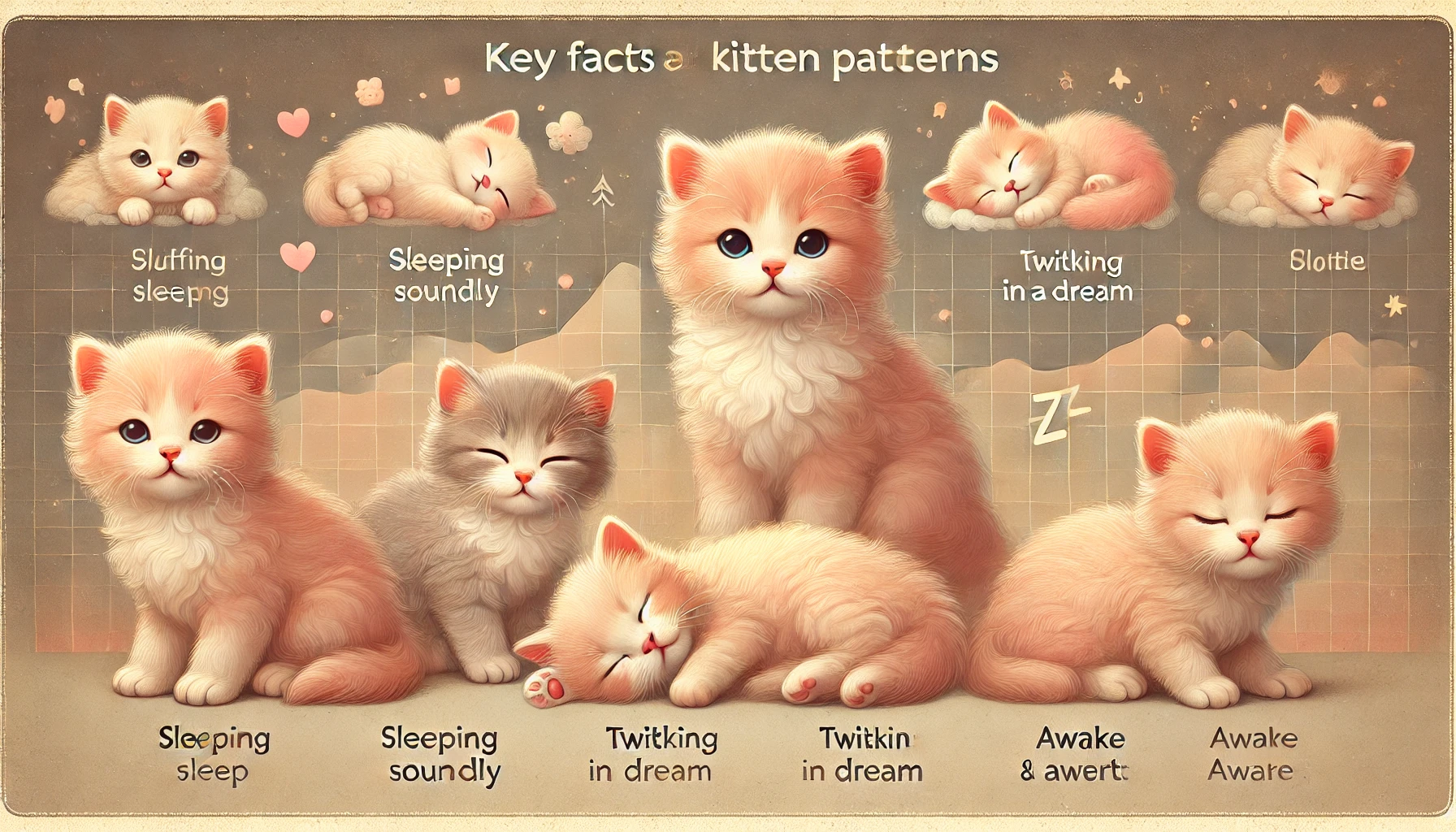
Overview: Key Facts to Know About Kitten Sleep Patterns
Understanding sleep patterns is very important for the overall development and growth of kittens.
Kittens need rest for their physical and mental development right from birth.
It is essential to provide your kitten with a sleep-friendly environment and recognize normal and abnormal sleep behavior to keep your kitten healthy and happy.
New kitten owners can learn a great deal about these patterns to provide the best care possible.
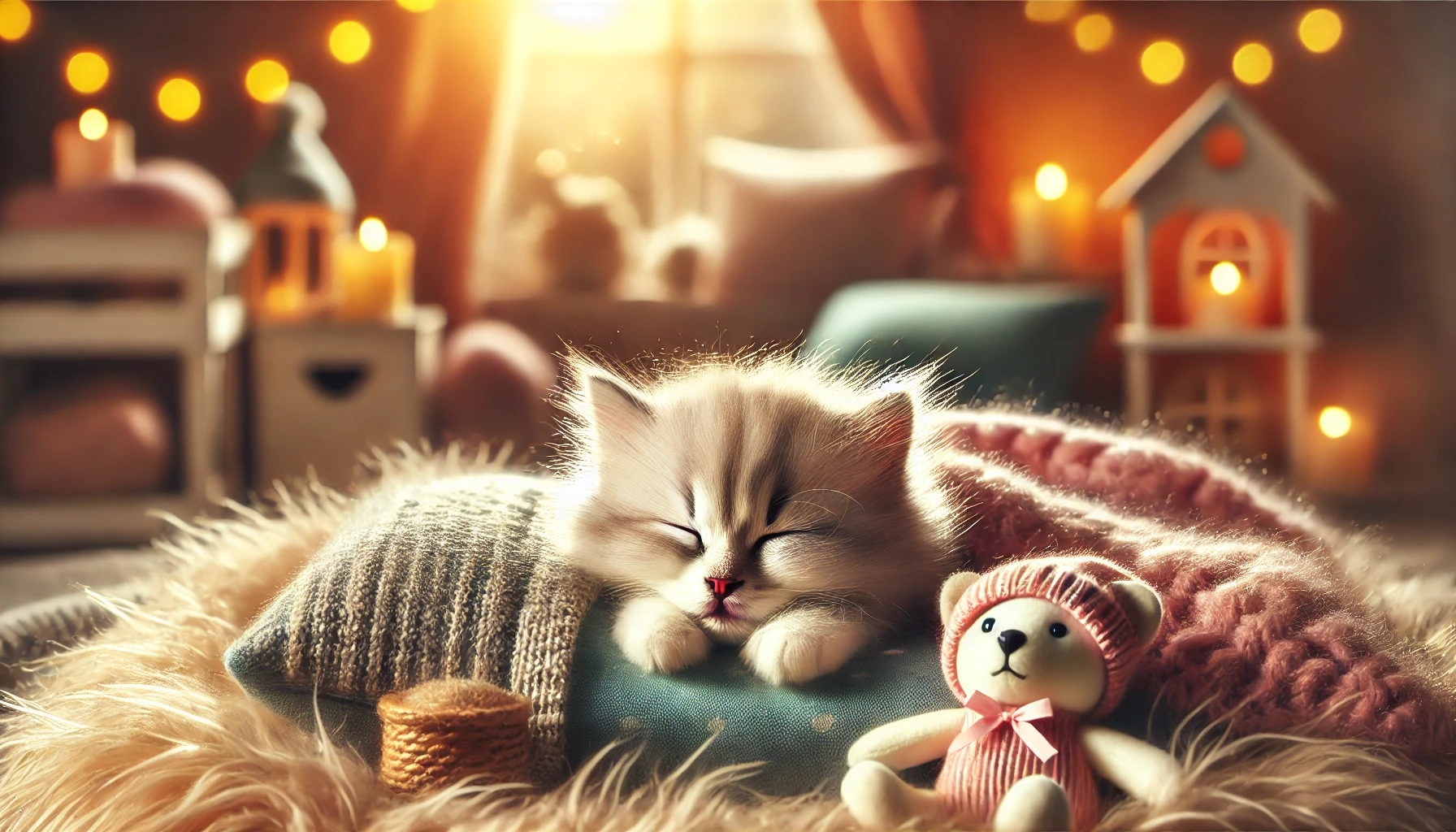
Sleep Is Important for Kittens
Sleep is an integral part of a kitten’s life, helping with physical growth, cognitive development, and strengthening the immune system.
In their early stages, kittens can sleep up to 18-22 hours a day, which is crucial for their body’s repair and development.
As they mature, their sleep patterns will start to resemble those of adult cats, but sleep remains an important factor in their well-being.
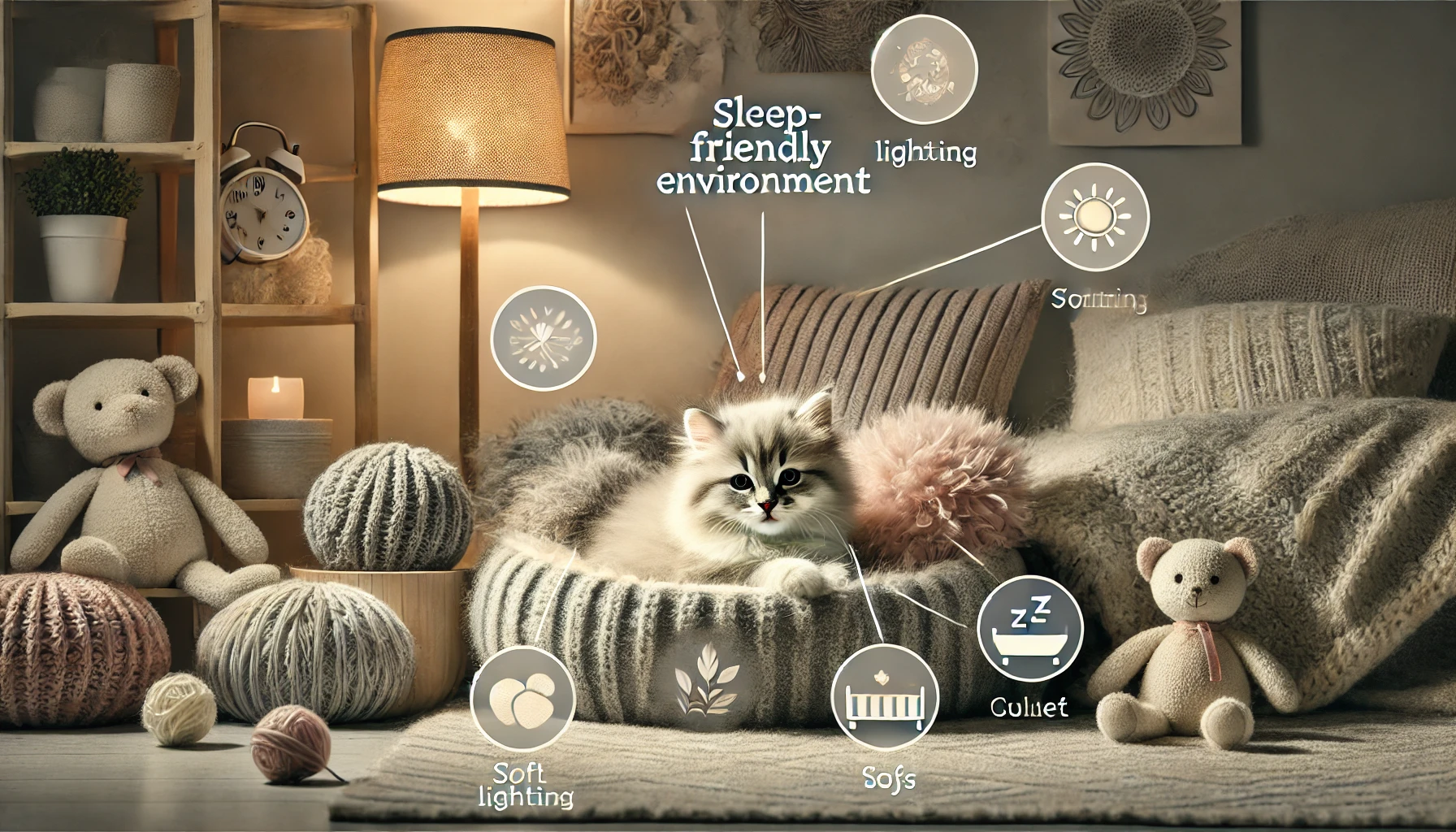
Creating a Sleep-Friendly Environment
Kittens require a quiet and comfortable sleeping area.
Essentials include maintaining a warm temperature around 75°F, using soft bedding, minimizing noise, and reducing distractions.
Establishing a routine for feeding, playtime, and sleep also helps promote healthy sleep behavior.
A consistent routine further aids in reducing anxiety, allowing your kitten to sleep more soundly.
- Keep the temperature at about 75°F for comfort.
- Use soft, easy-to-clean bedding.
- Reduce noise and interruptions by placing the bed in a quiet area.
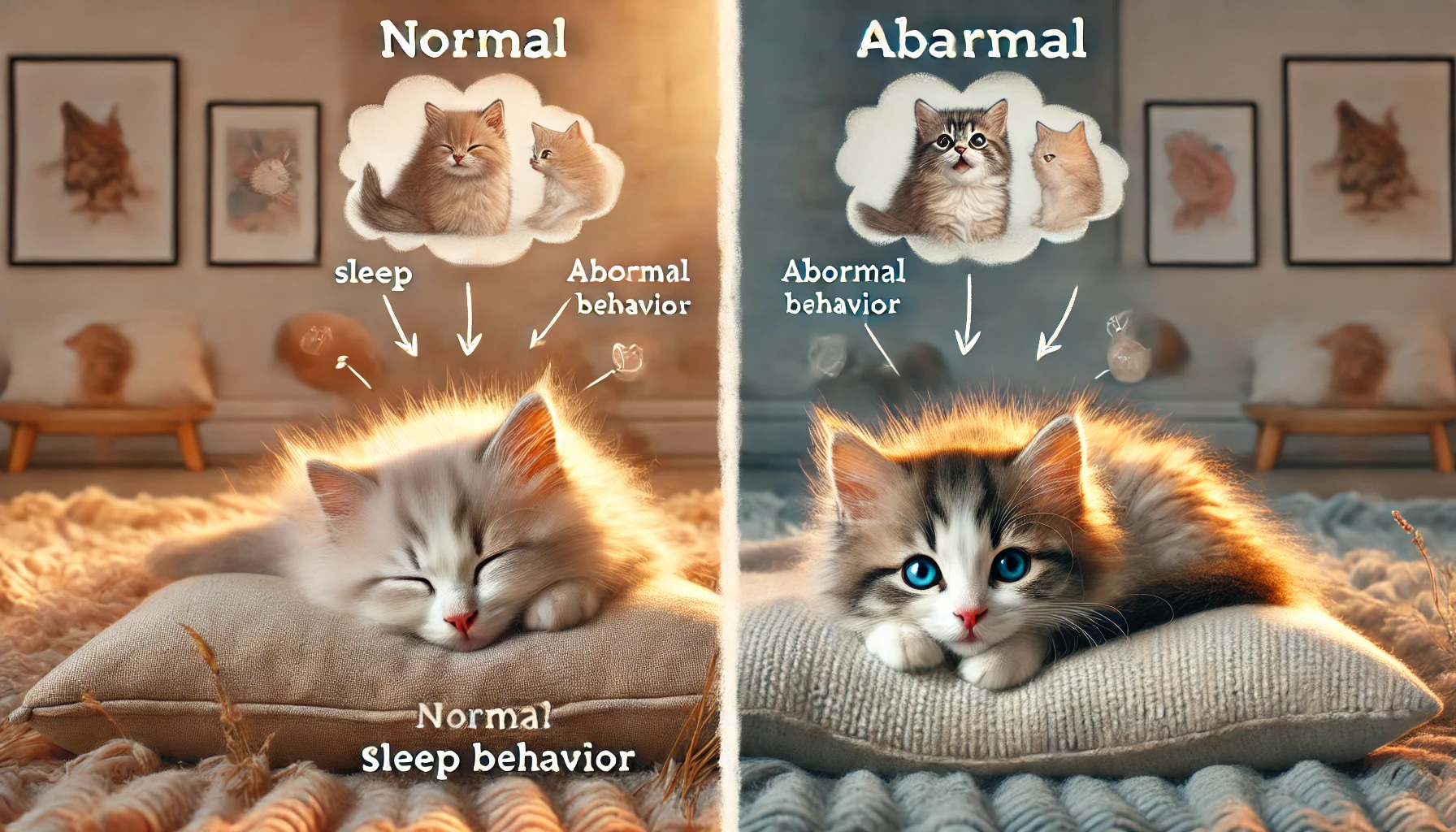
Determining Normal and Abnormal Sleep Behavior
Kittens display many normal sleep behaviors, such as twitching during REM sleep and waking frequently.
However, it’s important to recognize signs of disrupted sleep, as they may indicate health issues.
Noisy snoring, gasping for air, or excessive lethargy could be symptoms of sleep apnea or anxiety.
Monitoring your kitten’s sleep patterns and consulting a veterinarian when needed can help prevent potential problems.
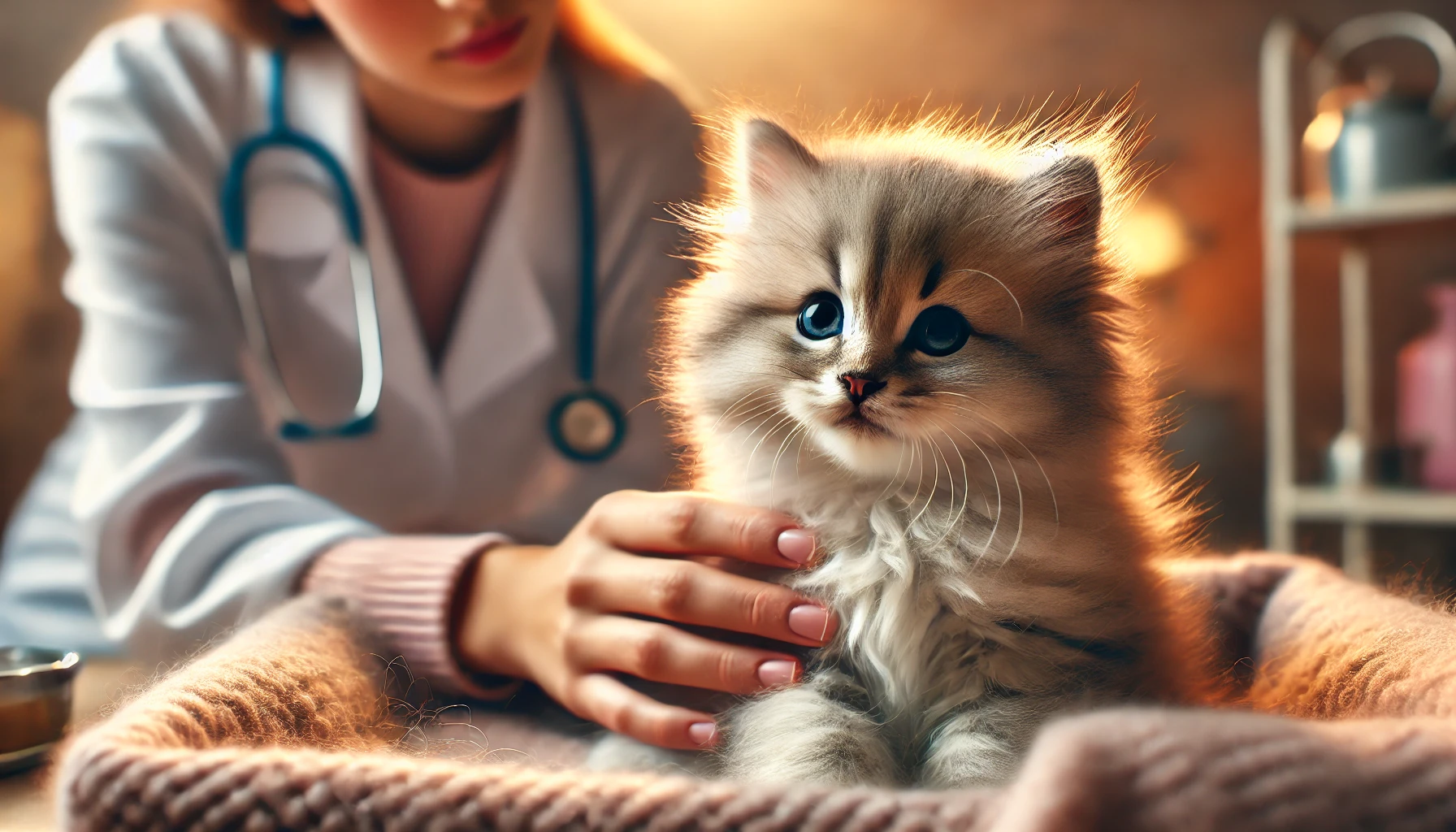
Addressing Sleep Disorders
Sleep disorders in kittens, such as sleep apnea or restlessness due to anxiety, can affect their overall development.
Early identification and intervention, including adjusting the sleep environment or seeking veterinary care, can help ensure your kitten gets restorative sleep.
Establishing a calming bedtime routine and engaging in stimulating play during the day are effective ways to promote healthy sleep patterns.

Final Thoughts on Kitten Sleep
In conclusion, sleep is one of the building blocks of kitten care.
Understanding normal sleep patterns and creating a comfortable environment for your kitten will foster their health, growth, and overall happiness.
Meeting their sleep needs while staying alert to potential issues will help your kitten grow into a strong and energetic adult cat.
Proper sleep is crucial for a kitten’s growth and health. Ensuring a comfortable environment helps their development.
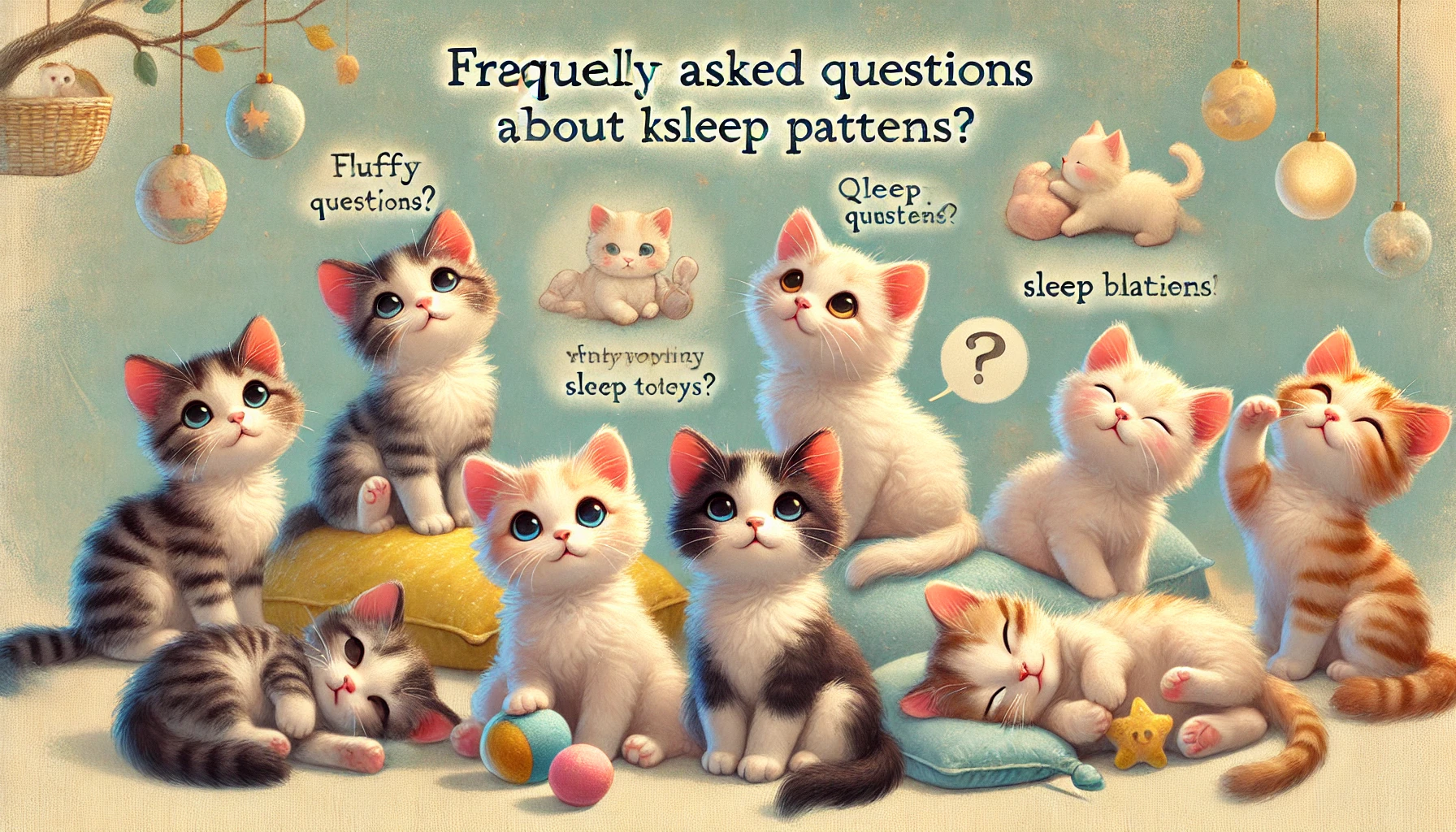
Frequently Asked Questions About Kitten Sleep Patterns
Below are some common questions and answers about kitten sleep patterns that can help new kitten owners understand the importance of sleep, recognize normal behaviors, and address any concerns regarding their kitten’s rest and overall development.
How many hours of sleep does a kitten need daily?
Kittens typically need between 18 to 22 hours of sleep per day, especially during their first few months of life.
This sleep supports their physical and mental development, and as they mature, their sleep hours gradually decrease.
Does twitching while sleeping occur naturally in kittens?
Yes, it is normal for kittens to twitch during sleep.
This indicates they are in the REM sleep stage, where dreaming occurs.
Twitching shows that your kitten’s brain is processing information and developing as expected.
How can I create a sleep-friendly environment for my kitten?
To create a sleep-friendly space for your kitten, ensure the area is warm (around 75°F), quiet, and free from distractions.
Provide soft bedding, establish a consistent routine, and maintain a calm atmosphere to promote restful sleep.
When should I be concerned about my kitten’s sleep patterns?
If your kitten sleeps excessively, has difficulty waking, or shows signs of stress such as noisy snoring or gasping for air, it may indicate a health issue like sleep apnea.
It’s best to consult a veterinarian in these cases.

